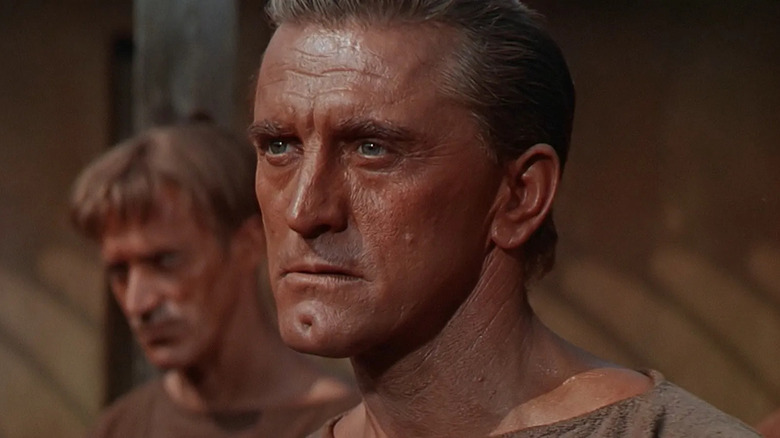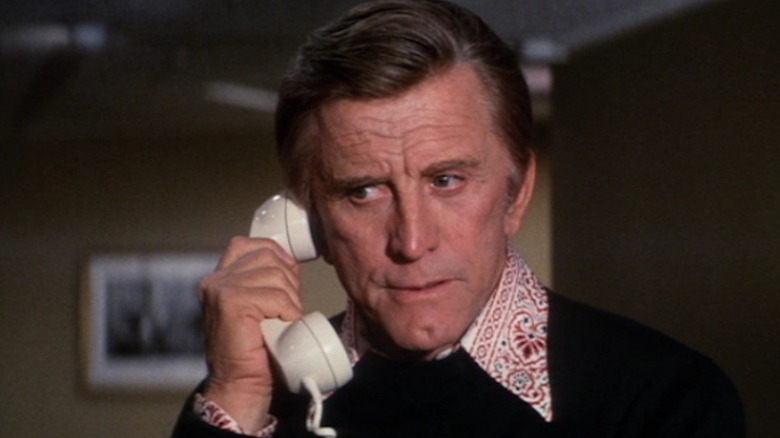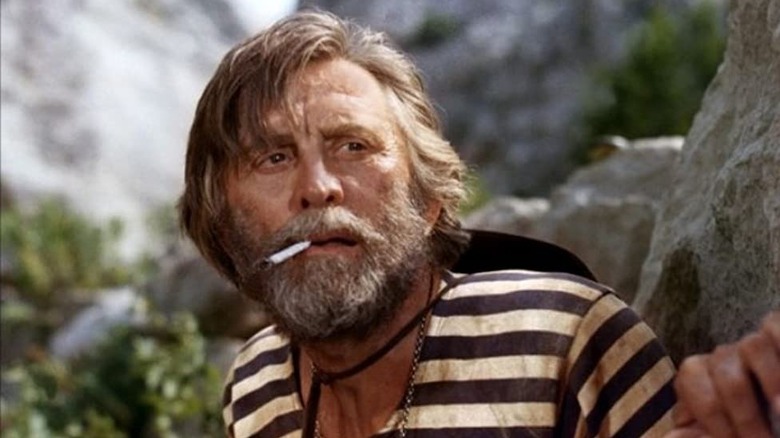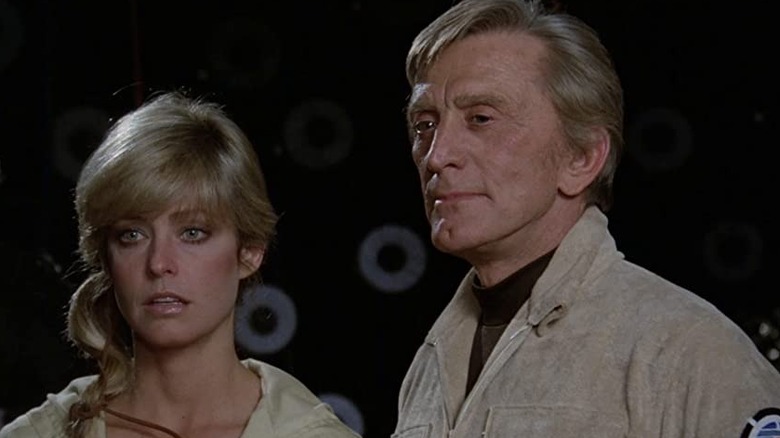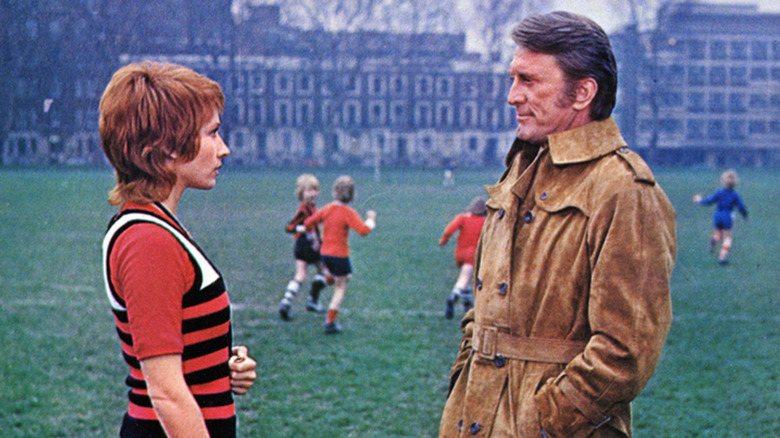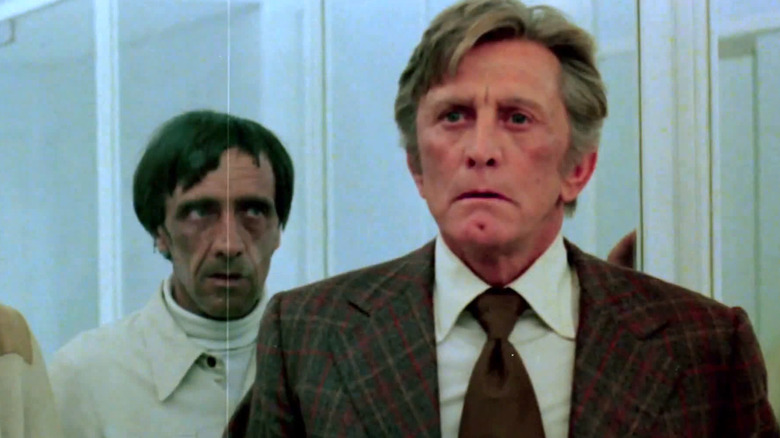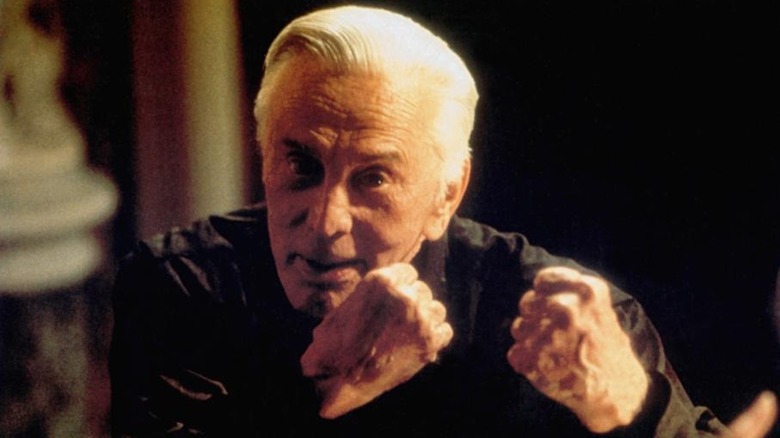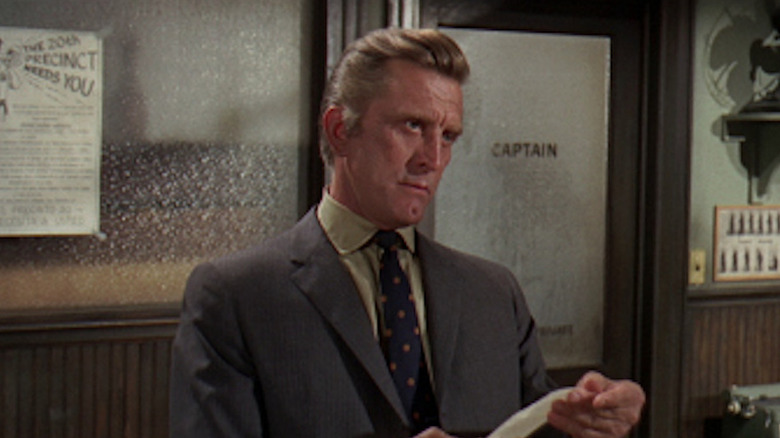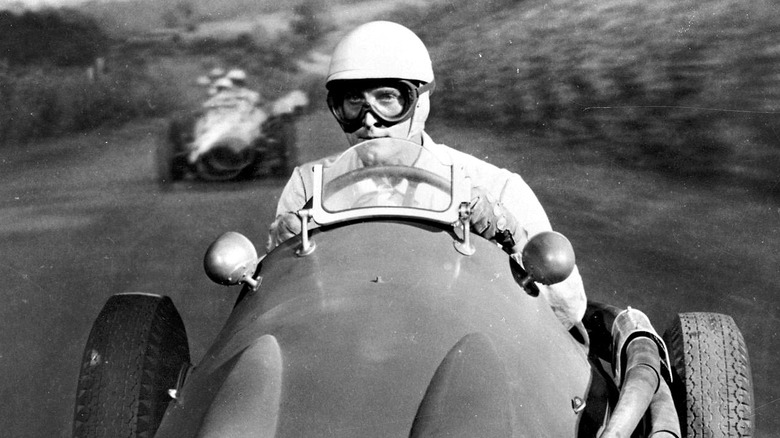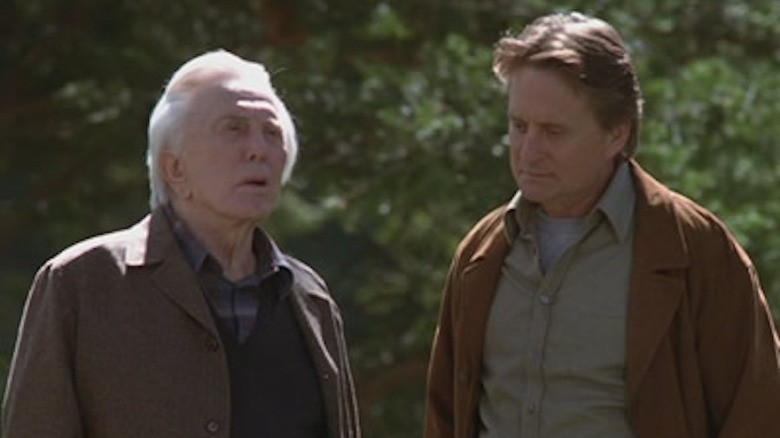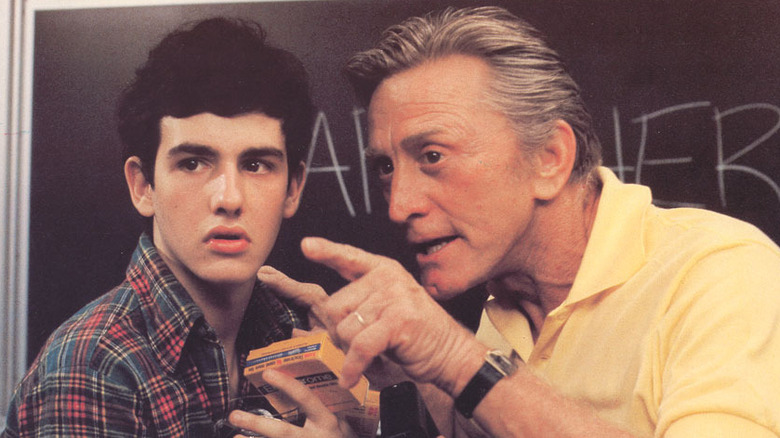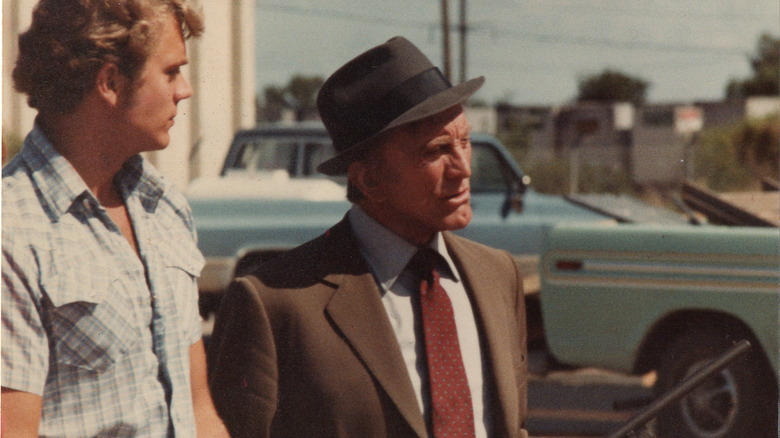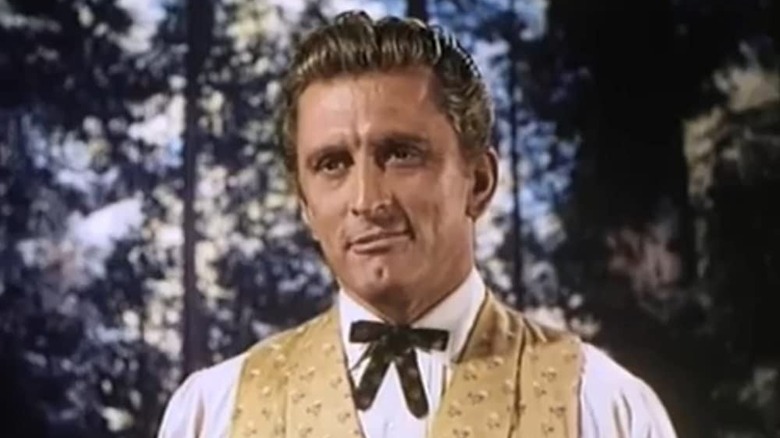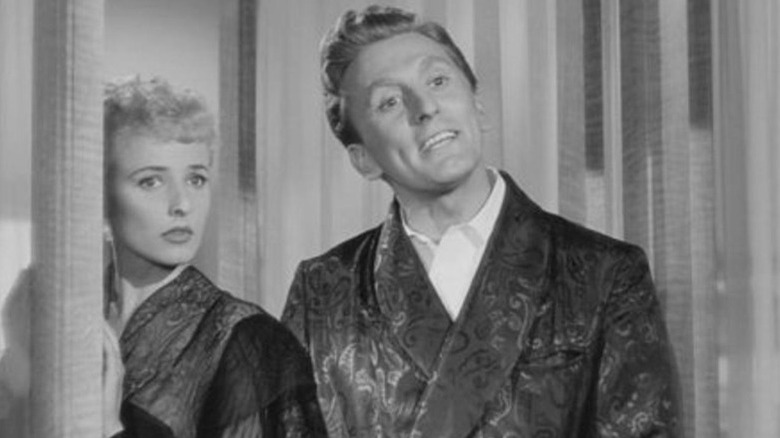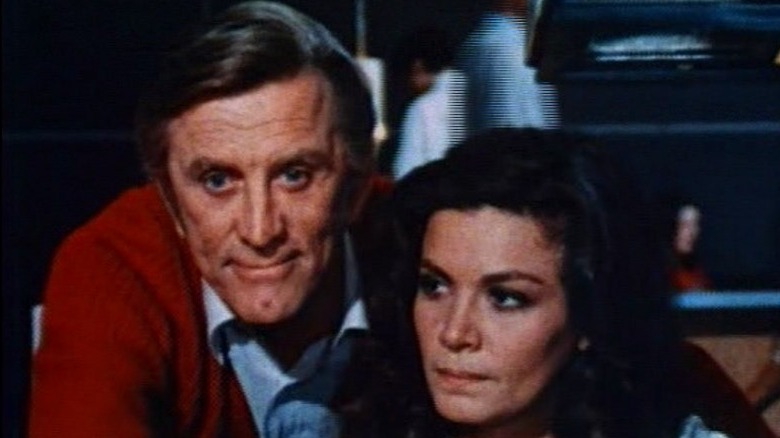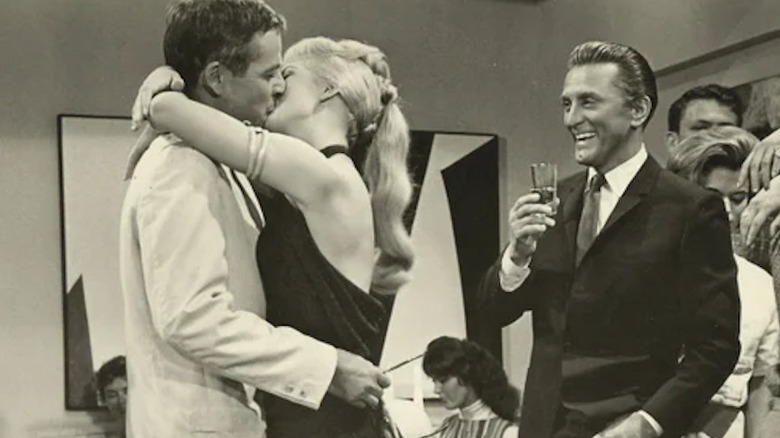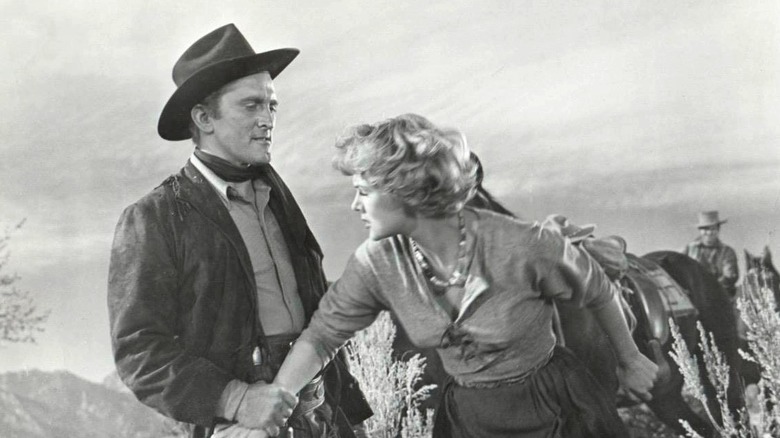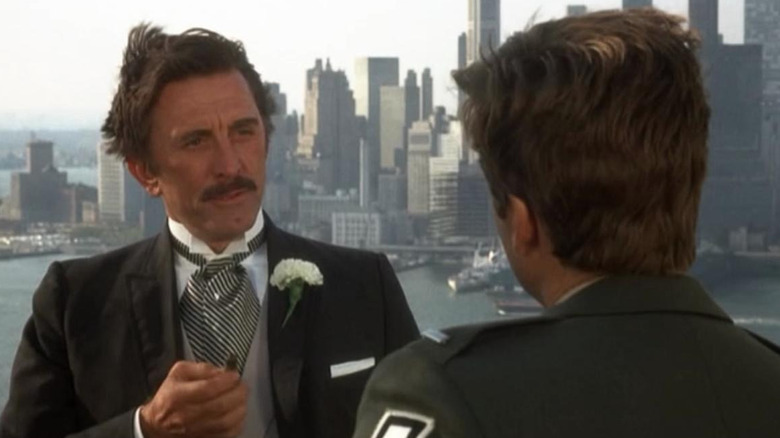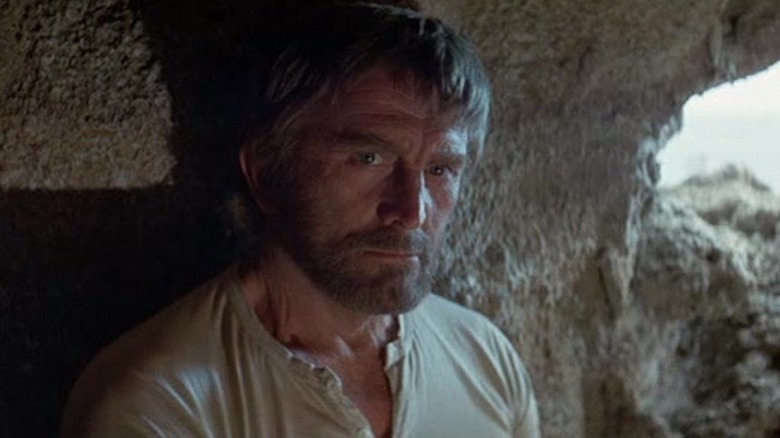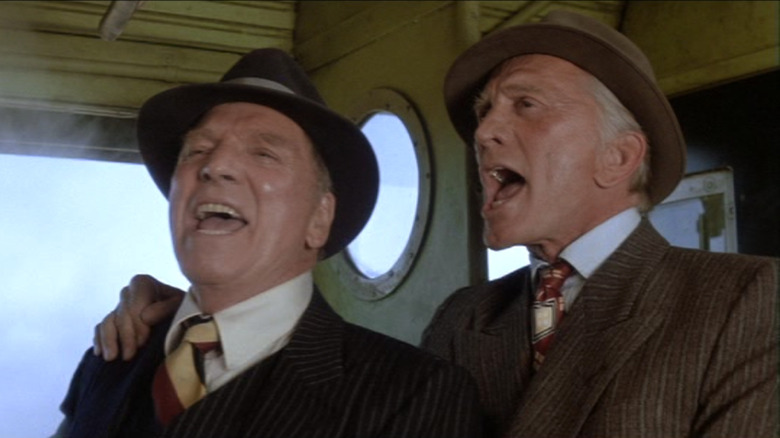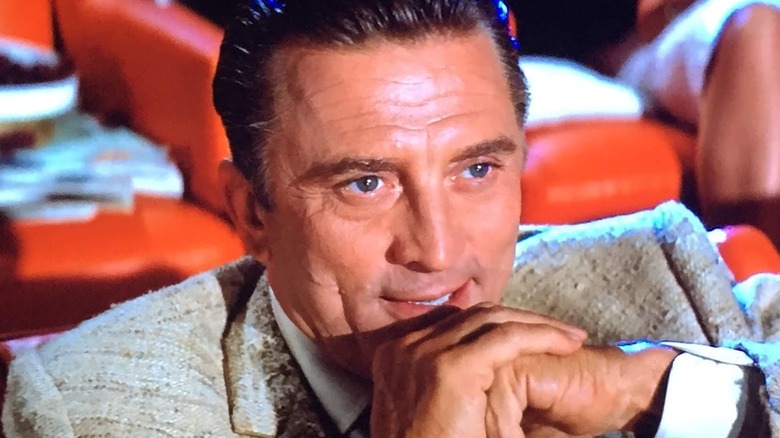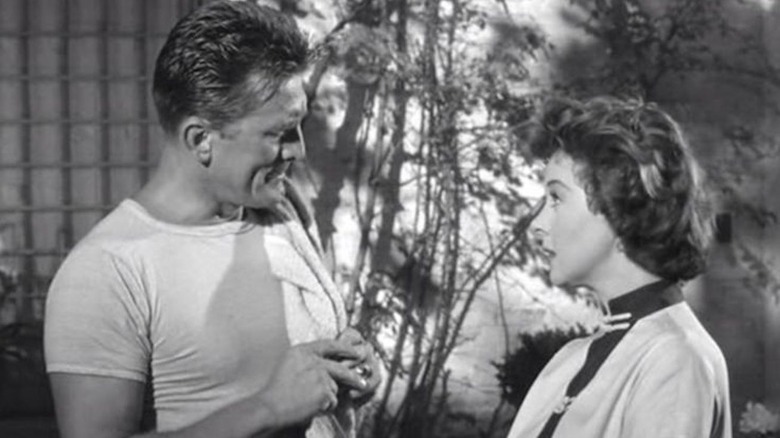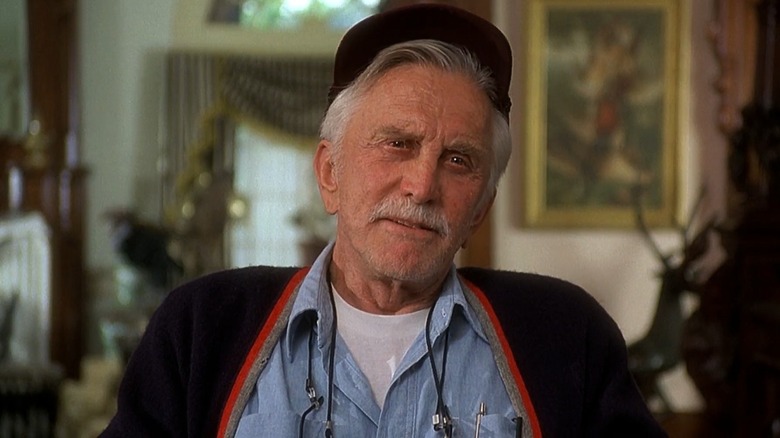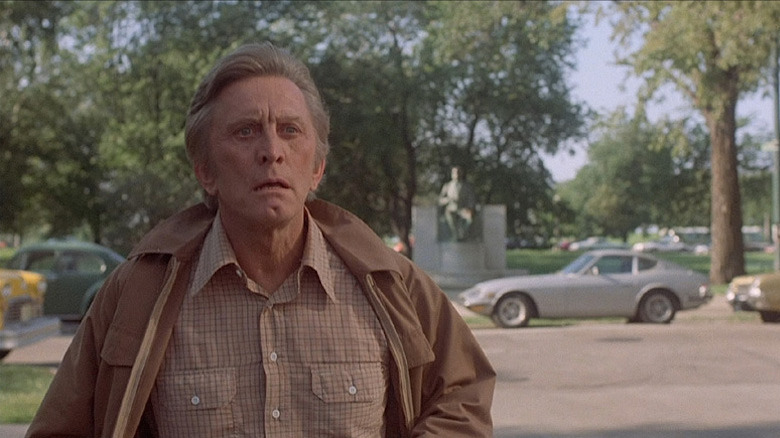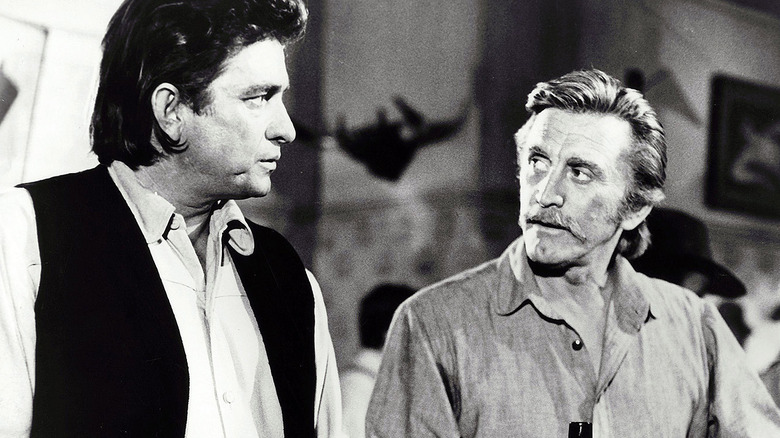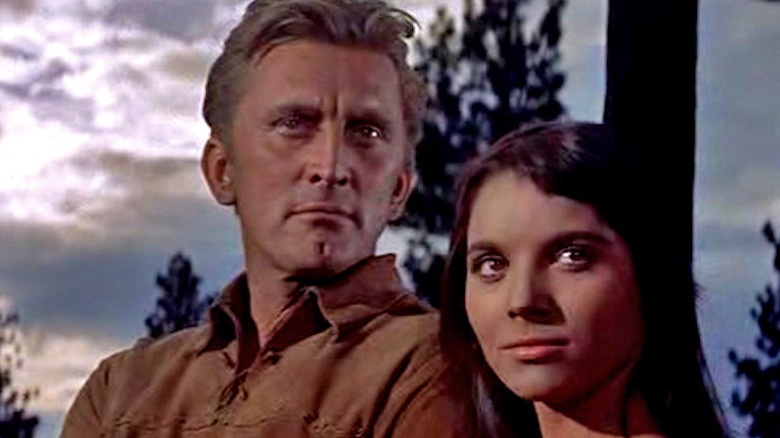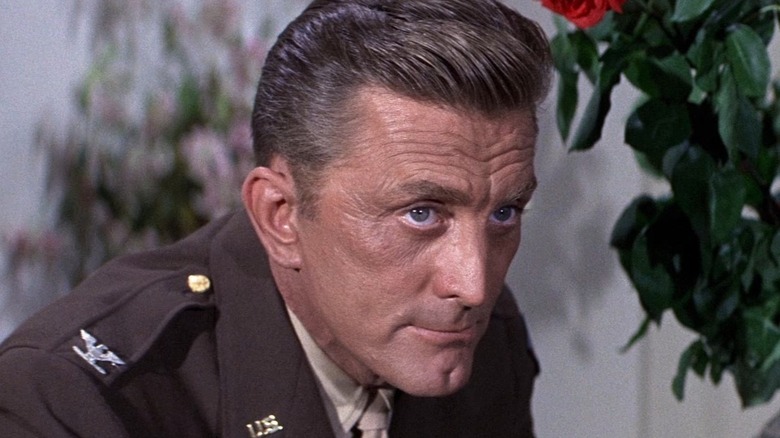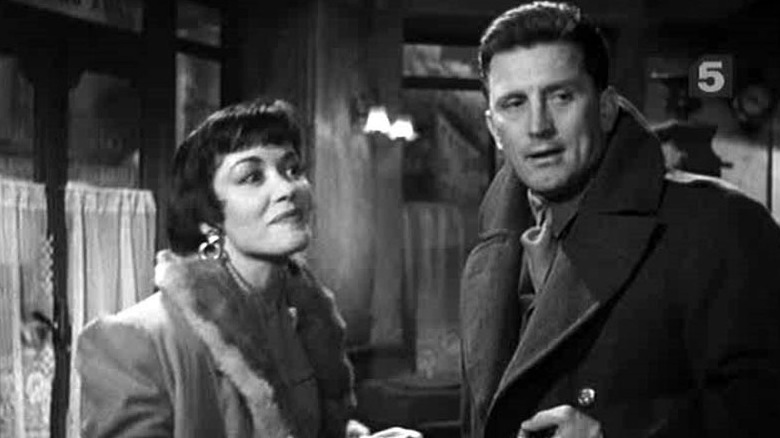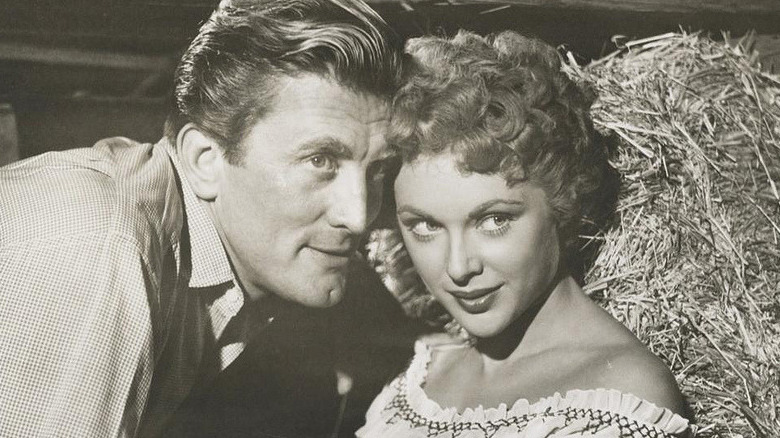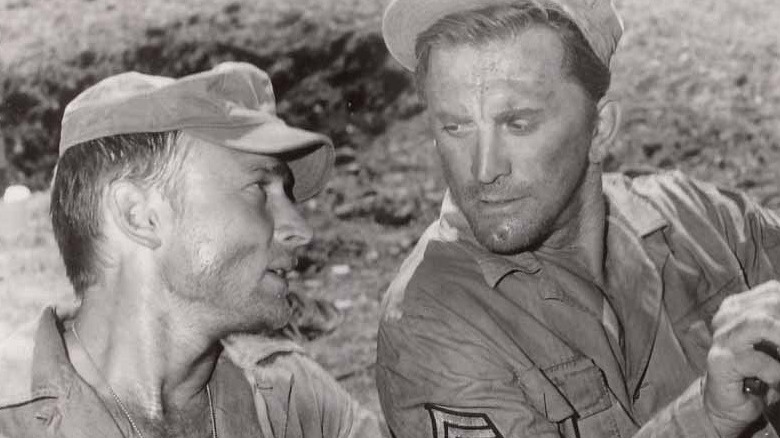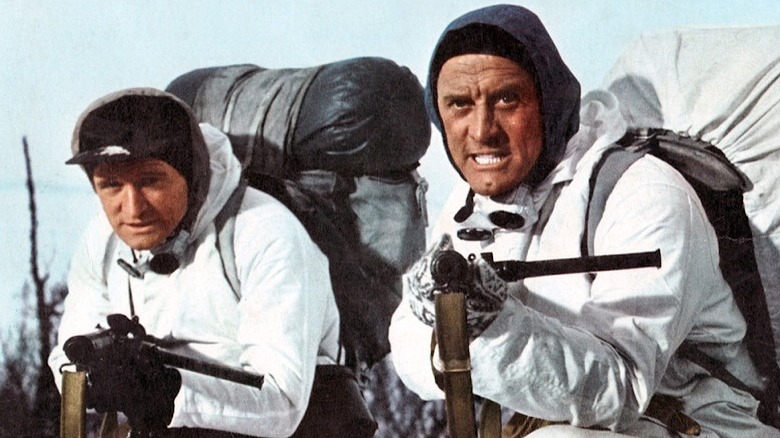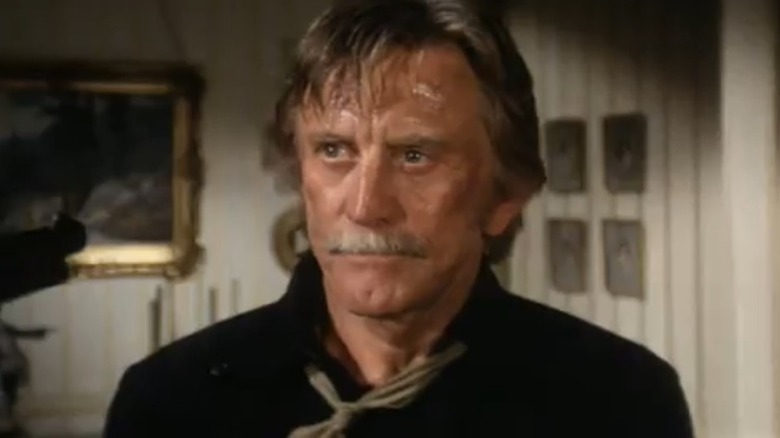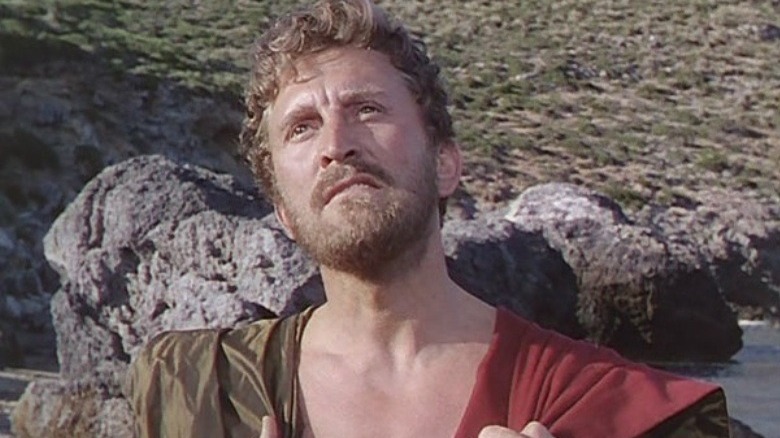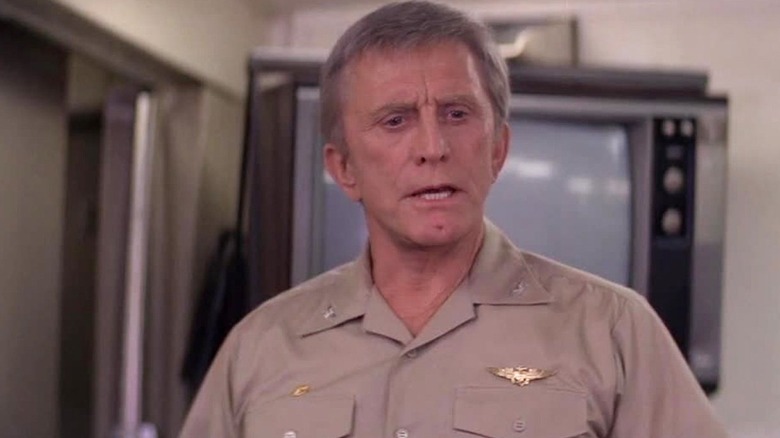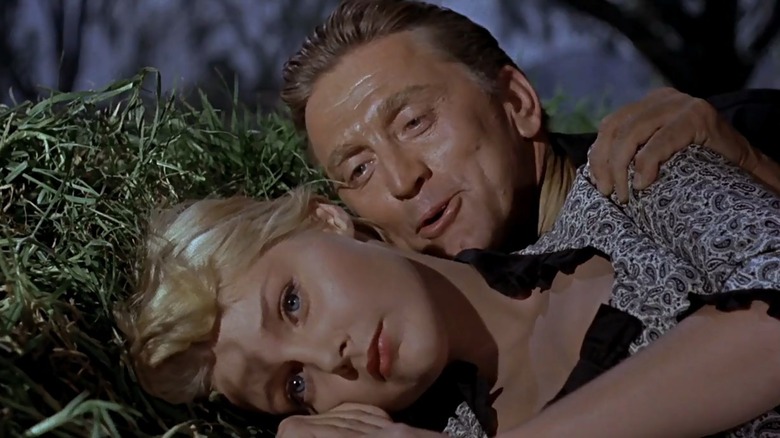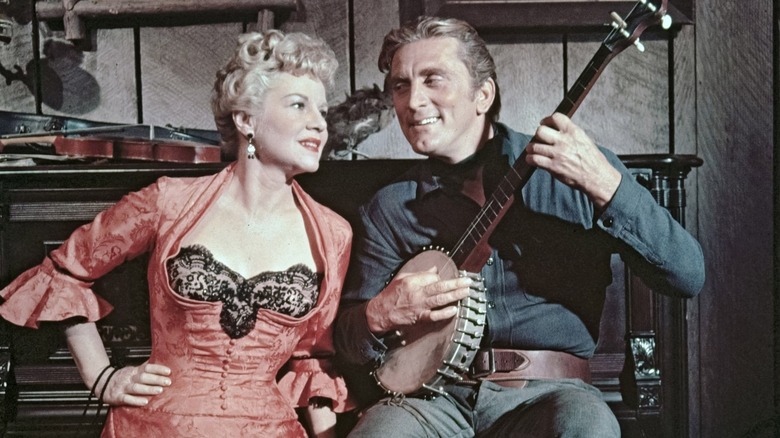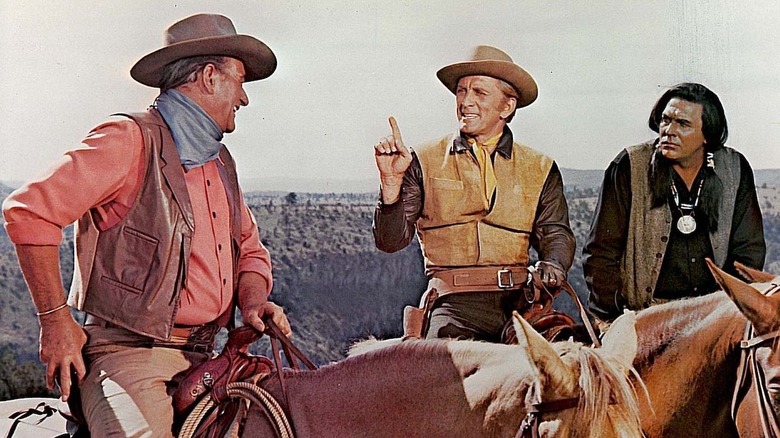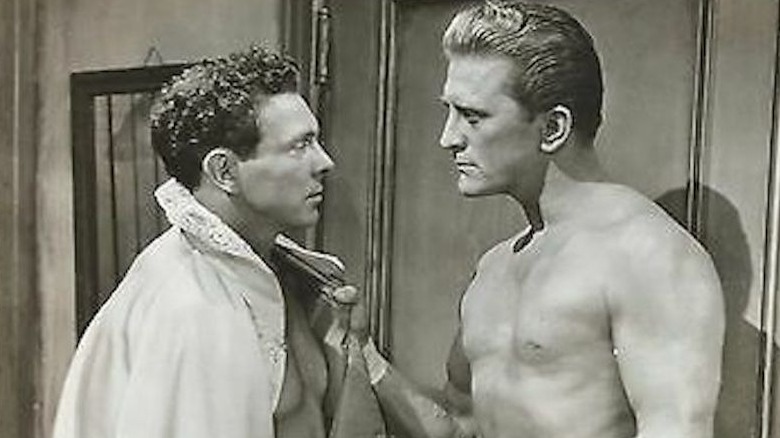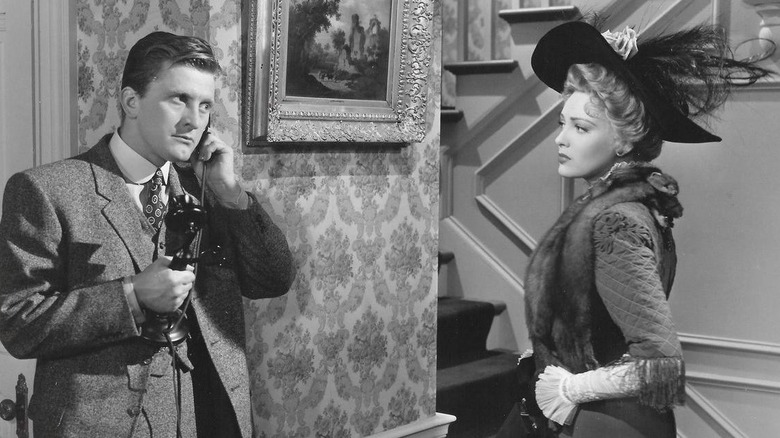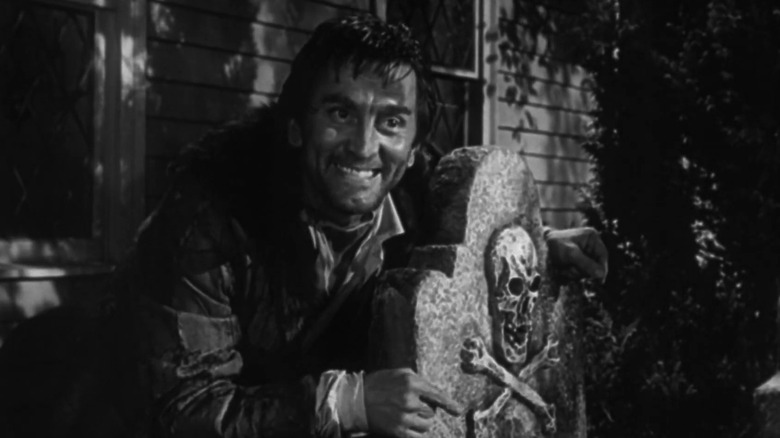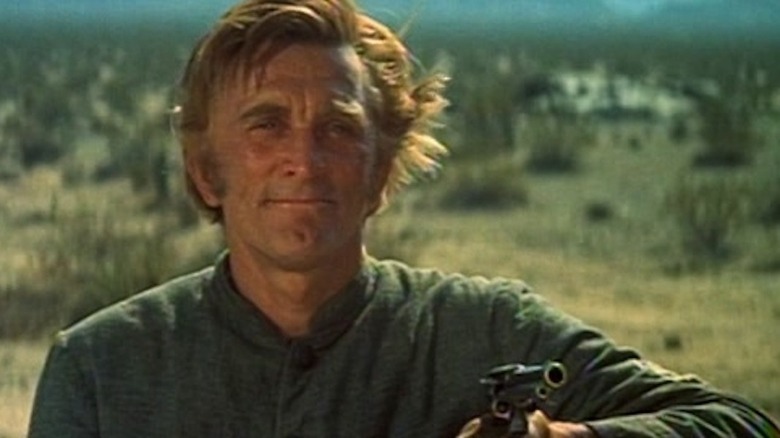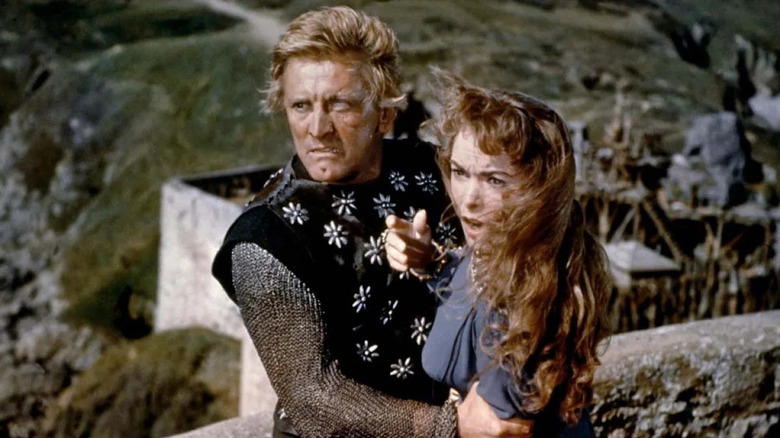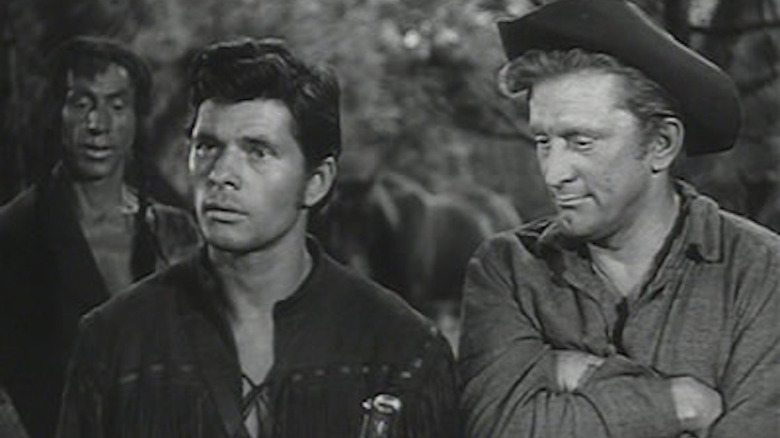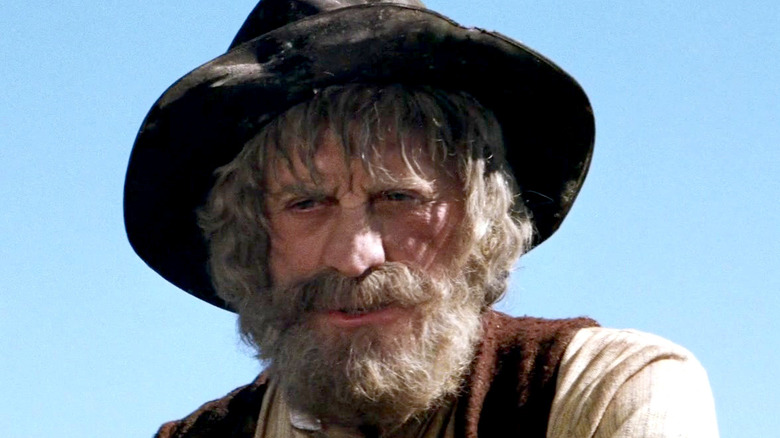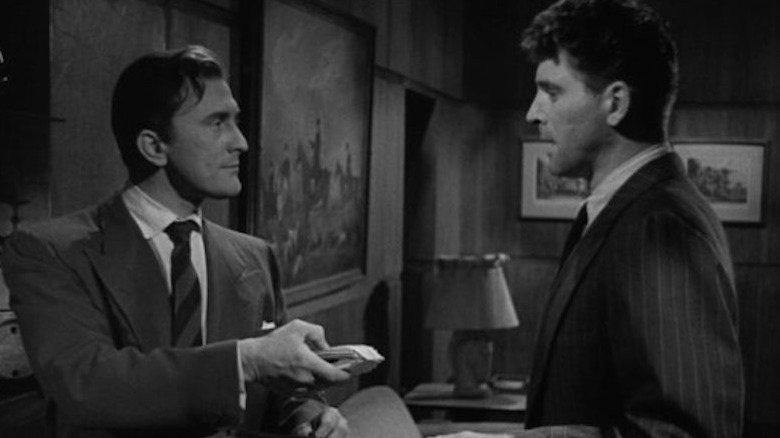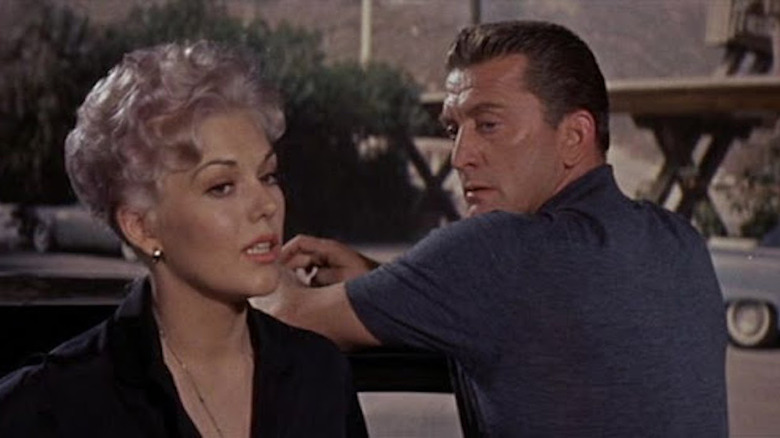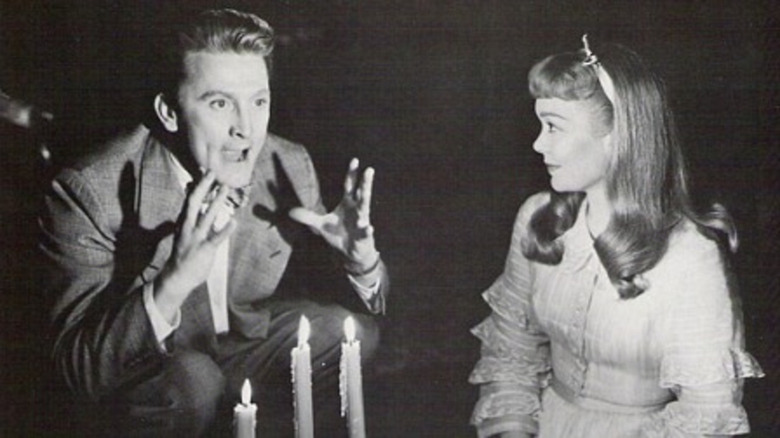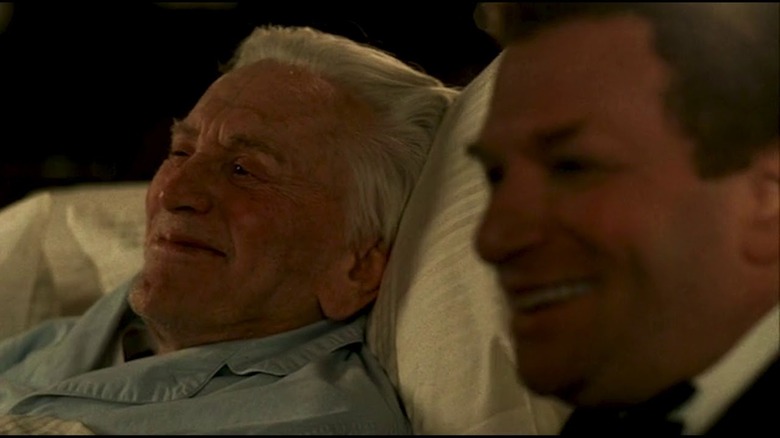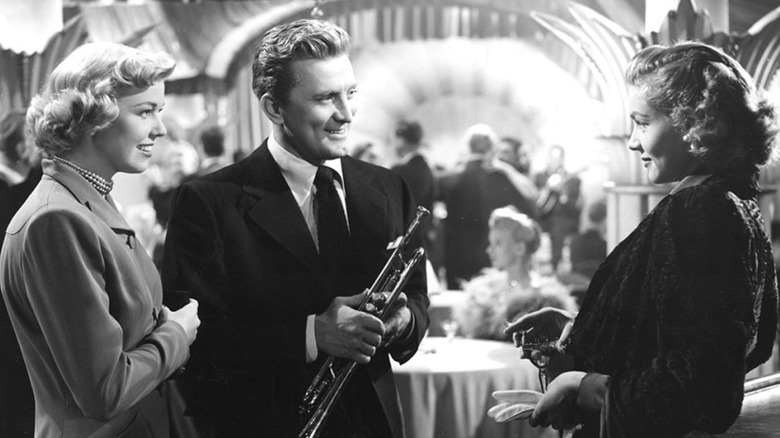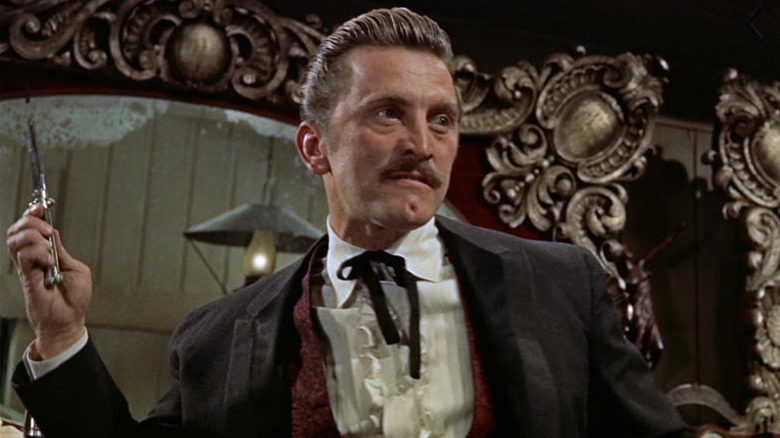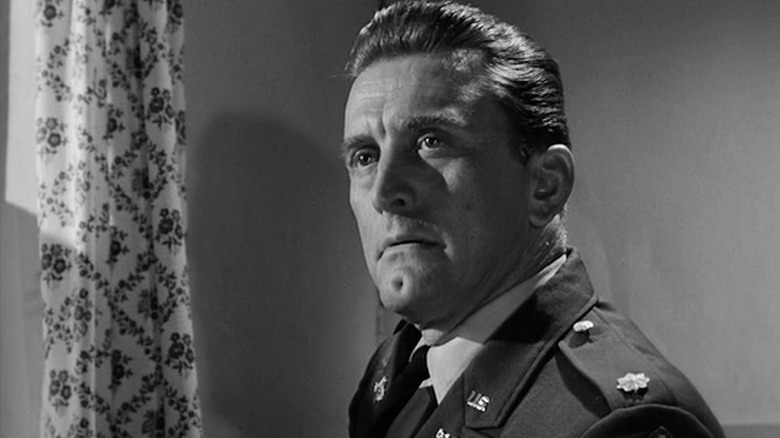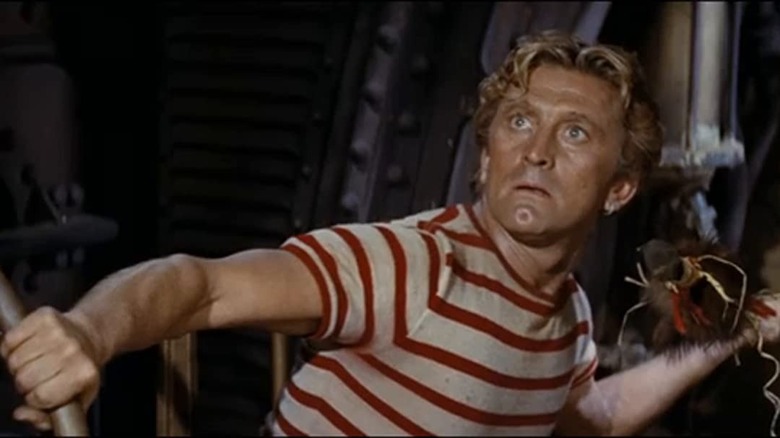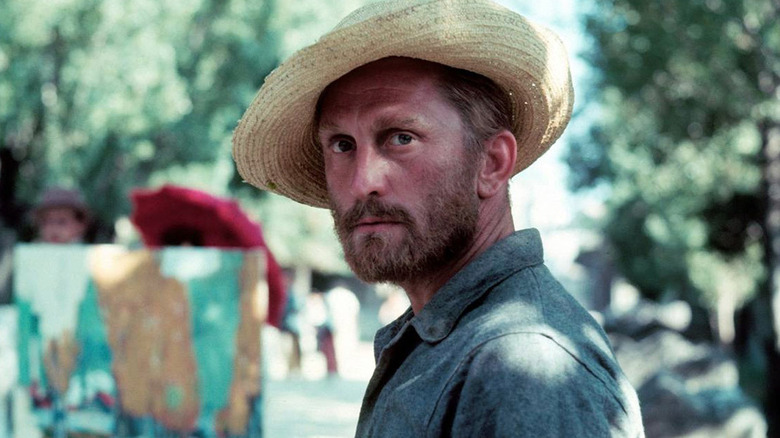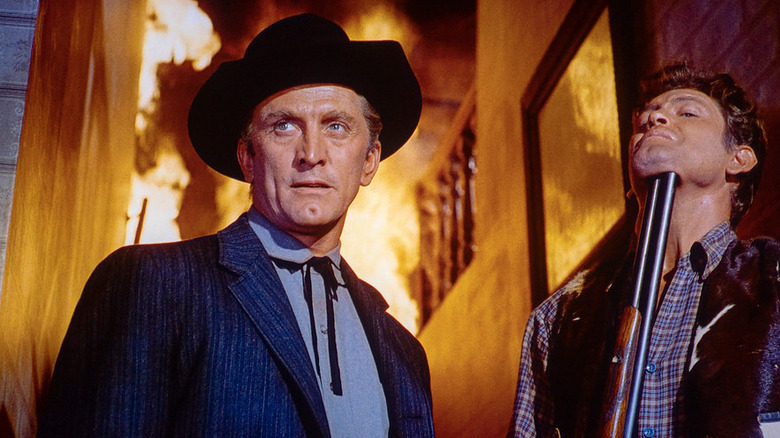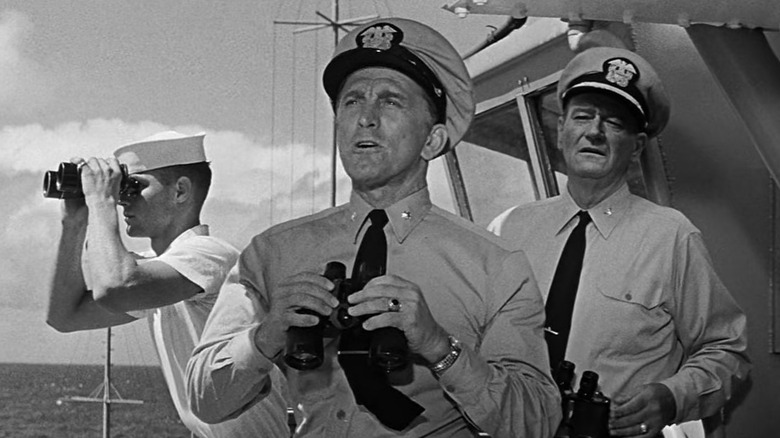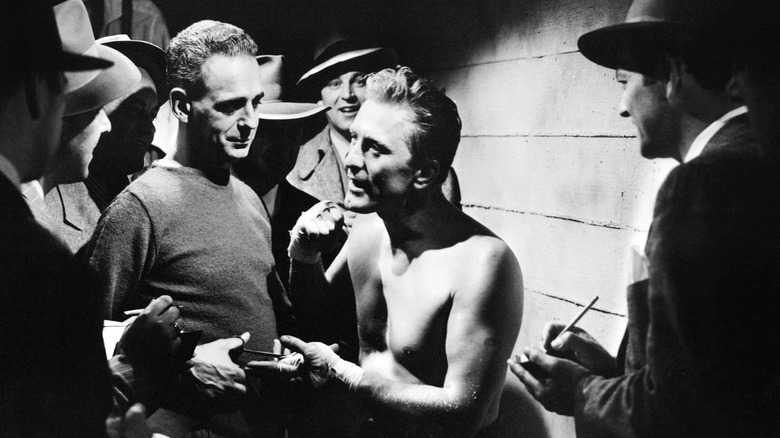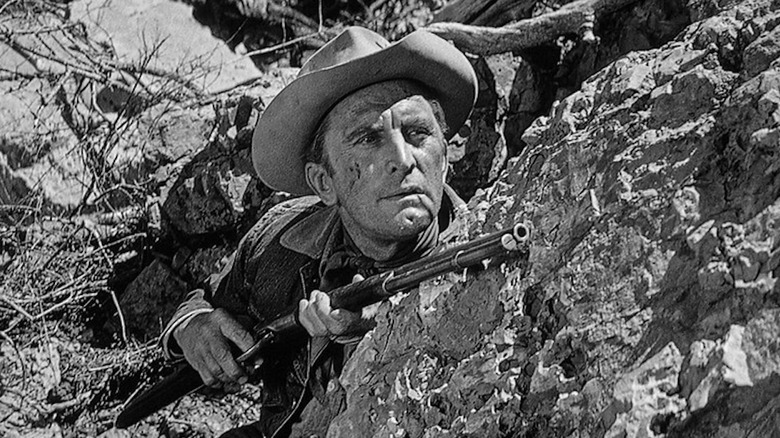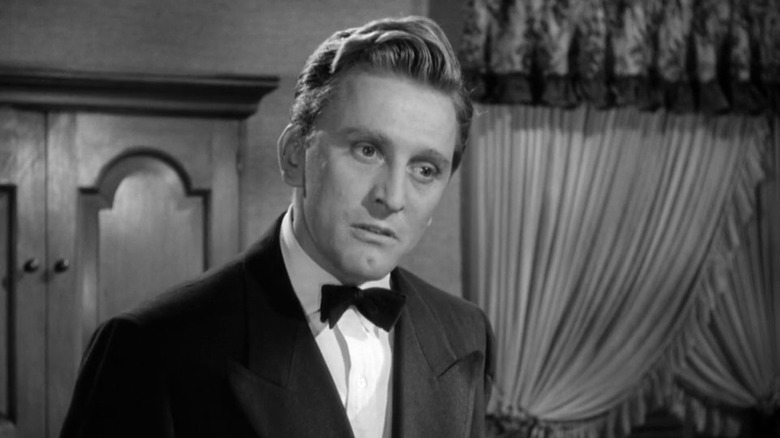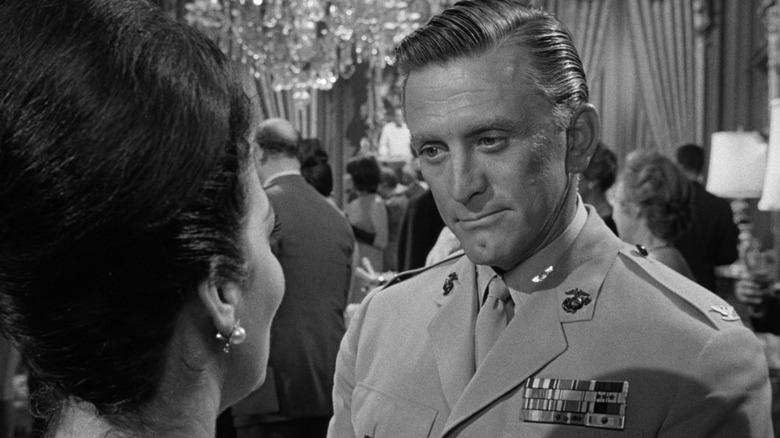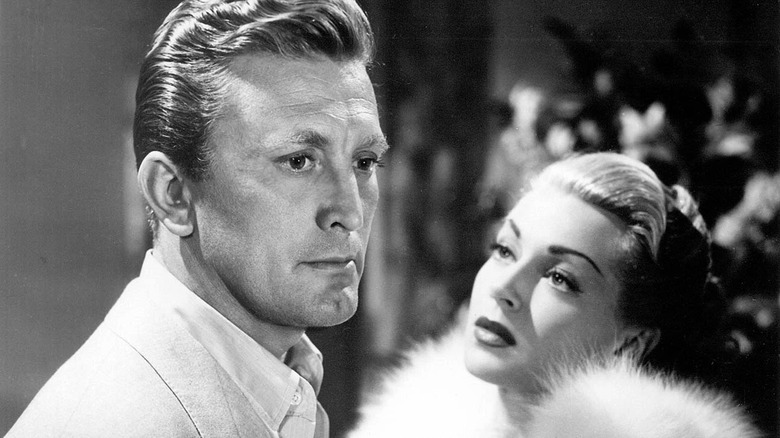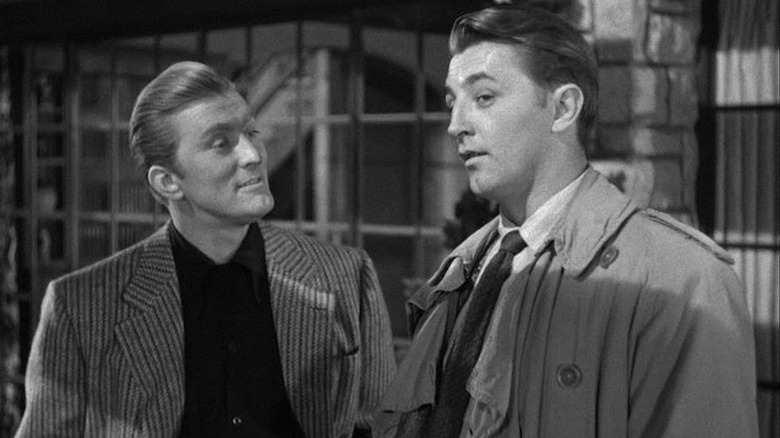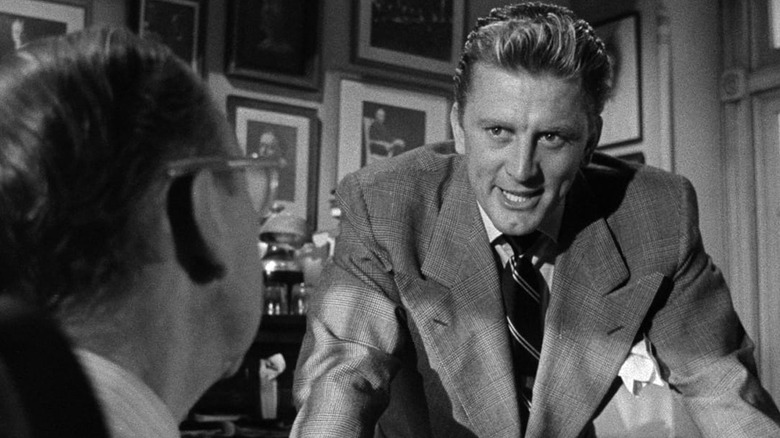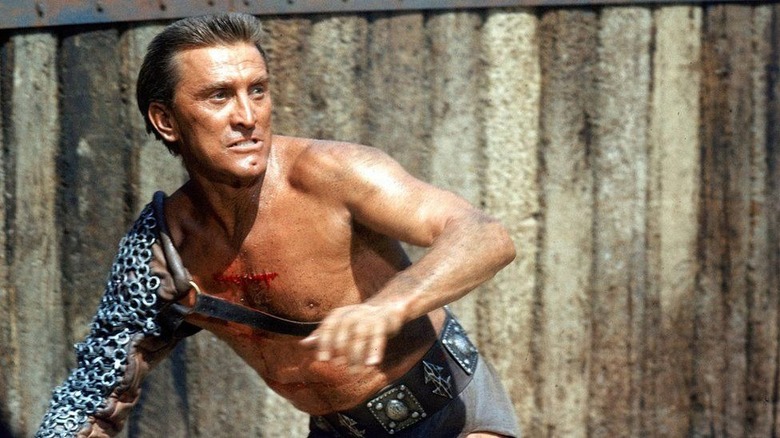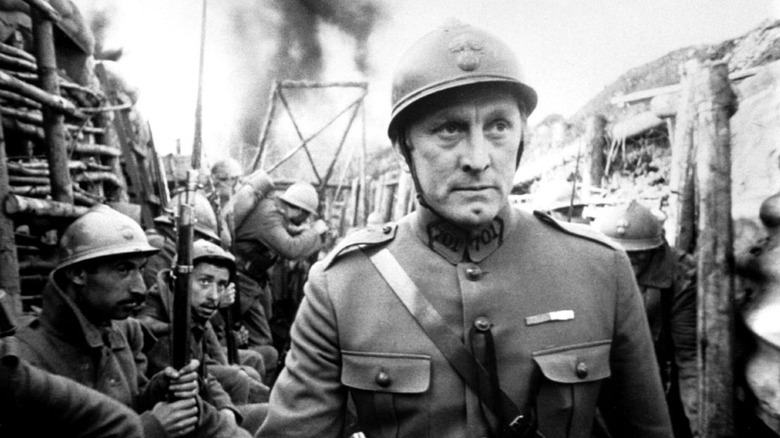Every Kirk Douglas Movie Ranked Worst To Best
Hollywood's original tough guy, Kirk Douglas stars in more than 60 big screen features, in some of the most celebrated films of all time. Father of star Michael Douglas, he was a square-jawed, barrel-chested leading man who ruled Tinseltown for decades. From film noir detective stories, to steamy romances, war epics, and classic westerns, Douglas did it all. He costars with some of his eras biggest names, including Doris Day, Burt Lancaster, Janet Leigh, Robert Mitchum, and John Wayne.
And his greatness never seemed to decline even past his prime, as he produced a number of high quality pictures even into his 80's and beyond. The star of the landmark Roman epic "Spartacus," and the groundbreaking anti-war movie "Paths Of Glory," Douglas has done it all. He branched out in the 1970s into the world of supernatural, horror and science fiction films, never afraid to try new things. With over his 60 years in the business, his career was a prolific and varied one. Here we've ranked every movie he made where he featured in a starring role, and ranked them. Which will come out on top? Read on to find out.
Once Is Not Enough
In this steamy 1975 romantic drama, Kirk Douglas plays Mike Wayne, an aging movie producer whose best days are behind him. Desperate to continue his high-priced lifestyle, he enters into a marriage of convenience with wealthy socialite Deidre Granger. But when Wayne's daughter January returns to New York City from school abroad, she's distraught to find her father wed to the overbearing, thoughtless, and cruel Granger. Directionless, and exposed to New York's decadent lifestyle for the first time, January explores a free-spirited night life, eventually partnering with a rival of her father's, which estranges her from him.
As Wayne's relationship with Granger turns sour, so too do January's poor decisions come home to roost. Though interesting at first glance for delving into controversial subject matter, "Once Is Not Enough" is a flat, lifeless romance story that was met with groans from critics, including the The New York Times. The paper lambasted the film so heavily that their review itself turned into a multiple choice joke, with the conclusion that it was "ludicrous, bad, terrible, [or] horrendous."
Peg Leg, Musket & Sabre
In the 1973 swashbuckling adventure film "Peg Leg, Musket & Sabre," Kirk Douglas takes a turn as a wooden-legged, cigarette chomping pirate named Peg. Douglas also took a turn in the director's chair for this one, the first of two directorial efforts in his career. In the film — alternatively titled "Scalawag" — Douglas' pirate leads a band of rag-tag lost souls, including a young boy, a teenaged girl, and a stereotypical parrot, on a quest for a long-lost hidden treasure. Along the way, the group have to do battle with a violent band of island natives and reconnect with Peg's former shipmates.
A complete disaster of a film, "Peg Leg, Musket & Sabre" is an awkward, patently ridiculous mix of cartoonish pirate stereotypes and some of the worst haircuts the '70s had on offer. Unless you're determined to sit through every film in Douglas' prolific filmography, or you just really love silly pirate b-movies, this one is an easy to skip.
Saturn 3
Kirk Douglas was never afraid to try new things and get involved in emerging trends. With science fiction on the upswing in the late 1970s after the likes of "2001" and "Star Wars," he'd take a stab at the genre himself with the 1980 sci-fi thriller "Saturn 3." The action opens on a remote research station on the outskirts of the solar system where an unhinged Captain Benson (Harvey Keitel) murders a fellow officer. From there he shuttles to another station in orbit of Saturn, manned only by Adam (Douglas) and his much younger companion and lover Alex (Farrah Fawcett) — and their dog.
Benson arrives and tells them that one of them is due to be replaced by a newly developed artificially-intelligent robot called Hector, who is programmed using brain tissue from Captain Benson. But being linked to Benson, the robot inherits the psychotic captain's thirst for blood and his desire for Alex, who he had planned to take with him off the station. Though a clever mix of science fiction and horror, "Saturn 3" just doesn't have the necessary thrills to be a successful slasher, nor any of the new and compelling ideas that make for a strong science fiction film.
Catch Me a Spy
In the 1971 film "To Catch A Spy," Kirk Douglas gives comedy a spin. The movie opens with a young French schoolteacher named Fabienne living in London when her new husband is kidnapped and held for ransom while on their honeymoon in Bucharest. The kidnappers want a jailed Russian agent exchanged for her husband, but when he (the agent) dies while being transferred to police custody, Fabienne must find her own agent to exchange for her husband. Serendipity strikes when she unmasks an apparent Soviet spy named Andrej (Douglas) posing as a waiter.
But matters become complicated when she learns that Andrej is more than he appears, and things get worse when their working relationship begins to turn romantic. Full of spy movie clichés and tired tropes, reviewers were left disappointed, with the Radio Times feeling that Douglas was perhaps miscast, as his performance felt out of place in a movie intended to be a comedy.
The Chosen — Holocaust 2000
Entering the booming genre of supernatural horror films, "Holocaust 2000" (sometimes titled as "The Chosen") was seen by many — including The New York Times — as a cheap knock-off of blockbuster hit "The Omen." Here Douglas appears as Robert Caine, an industrialist on the verge of opening a nuclear power plant despite doom and gloom warnings of disaster. But as the plant opens its doors and Caine flirts with the success of his latest project, he discovers the shocking truth that his own son is actually the devil incarnate.
In the body of Caine's son, the demon has come to Earth to use his "father's" newest endeavor to achieve hell on Earth. While Caine investigates the situation, he realizes that what he thought was a brilliant new industrial project is really the prophesied end of days. Punctuated by loads of poorly executed blood and gore, it's a pale imitation of other films of its kind, leaving Douglas himself and a score by Ennio Morricone as the only noteworthy elements in the movie.
Diamonds
Former boxing champ Harry Agensky (Kirk Douglas) is whiling away the twilight years of his life when his estranged son Lance (Dan Aykroyd) looks to repair his relationship with both his father and his own son Michael (played by Corbin Allred) and invites the pair on a skiing trip. But Harry diverts them to Nevada, claiming he knows of a hidden stash of diamonds he stored away after being paid off from a fight decades before. With the treasure, he hopes to finally buy a ranch to live out his days.
Along their journey to the southwest, the father, son, and grandson grow closer, in touching and sometimes humorous ways. A comedy with cheap laughs, it still manages a heartfelt exploration of the bond between father and son. And while noted critic Roger Ebert called it "junk" he also called it "inspiring" and "a demonstration of Kirk Douglas' heart and determination." Interestingly, clips from Douglas' own 1949 hit "Champion" were used to show flashback's to Agensky's days as a young boxer.
A Lovely Way to Die
The 1968 neo-noir crime drama "A Lovely Way to Die" stars Kirk Douglas as hard-boiled detective Jameson Schuyler. The tough-as-nails cop quits the force in protest of what he sees as a justice system too soft on crime and quickly starts his own private detective agency. His first case comes to him from Tennessee Fredericks (Eli Wallach) a lawyer who wants protection for his client Rena (Sylva Koscina), a woman accused of conspiring to murder her husband. But as Schulyer works the case, he soon realizes the charges against Rena may not be all they appear, and he takes it upon himself to find the real killer.
It turns out that Rena's alibi is rock solid, but when the witness turns up dead, Schulyer realizes Rena may be next on the hit list. Though a fairly standard and predictable crime thriller, it's nonetheless a diverting yarn. In the end, "A Lovely Way to Die" is held up by the likes of Douglas and Wallach, but let down by its often amateurish filmmaking, according to critic Roger Ebert, who awarded the film two stars.
The Racers
Playing a daredevil racecar driver, Kirk Douglas took the lead in "The Racers," a high speed action drama from 1955. In the film, Douglas' character Gino Borgesa is a reckless racer who falls in love with a beautiful ballerina named Nicole. But as their relationship blossoms, their love affair lives under the spectre of Gino's devil-may-care attitude. As their passion is ignited, so too are Gino's engines, which lead him into disaster, nearly costing him a leg.
Gino's obsession with winning at all costs continue creating problems, and Nicole must come to grips that he may never love her as much as he does the racetrack. Co-starring Cesar Romero and Lee J. Cobb, "The Racers" has some fun action sequences and some strong performers, but was underwhelming for the romantic drama it aspired to be.
It Runs in the Family
At 87 years old, Kirk Douglas would team with his son Michael Douglas and grandson Cameron Douglas in "It Runs in the Family." As you might suspect, the three actors play three generations of family, with Kirk as grandfather Mitchell, son Alex, and grandson Asher. Kirk Douglas' real life wife Diana Dill portrayed his wife in the film as well. The early 2000s comedy-drama centers on the Gromberg family, and the various troubles they face in their many relationships.
While Mitchell (Kirk Douglas) has recently suffered a debilitating stroke, Alex (Michael Douglas) finds his marriage hitting a rocky road when his wife (Bernadette Peters) finds evidence that he's been having an affair. Asher (Cameron Douglas) meanwhile has been neglecting his studies in college, but the family comes together after the death of matriarch Evelyn (Dill). Though the stunt casting makes the film worth watching, "It Runs in the Family" fails to make the most out of Kirk and Michael's only on-screen collaboration. In the end, it's a weak drama that tries too hard to pull at the heartstrings while the promise of comedy fails to deliver any meaningful laughs.
Home Movies
In their second pairing, director Brian De Palma (future director of the first "Mission: Impossible") and Kirk Douglas reteamed for the indie drama "Home Movies." A super-low budget feature, it follows a film professor who encourages a star pupil to make and star in his own movie. More celebrated for its production than for the film itself, it was spearheaded by DePalma, who at the time was himself teaching a film class at Sarah Lawrence College. Following Douglas' death in 2020, DePalma would look back at the experience working with the Hollywood icon on the project.
"My concept for the course was to show the students how to make a low-budget feature by making a low-budget feature," said the director. Douglas would join the film after their pleasant experience on their first project, 1978's "The Fury." The film would be partially financed by Douglas, with contributions from George Lucas and Steven Spielberg. A personal story that retells DePalma's own upbringing, it follows surgeon Dr. Byrd, an unhappily married man — who engages in many extramarital affairs — and his two sons, one of whom catches much of the family's drama on a 16mm home video camera.
Eddie Macon's Run
The action thriller "Eddie Macon's Run" sees Kirk Douglas playing grizzled detective Marzack, on the trail of escaped convict Eddie Macon. Macon is a loving family man who was imprisoned for minor offenses, but who received a long sentence after a failed escape attempt from behind bars. Now on the run, he seeks to reuinite with his wife and son across the Mexican border, but Marzack is in hot pursuit, and dead set on recapturing the wanted fugitive that he's tangled with before.
Along Macon's run to the border, he encounters a young woman name Jilly who takes pity on him and helps him in his flight from justice. But even with help from a resourceful young woman by his side, Macon can't escape the long arm of Douglas' steely-eyed Detective Marzack. "Eddie Macon's Run" is a fairly conventional and unimpressive chase movie, but it's notable for being "The Dukes of Hazzard" star John Schneider's feature film debut. Unfortunately, it wouldn't skyrocket Schneider to superstar status on the big screen.
The Big Trees
In a surprise departure, Kirk Douglas plays a quasi-villain in the 1952 western drama "The Big Trees." As timber tycoon Jim Fallon, Douglas stars as a man set on stealing the rich redwoods of a newfound California forest. But the big trees sit on the homestead of Elder Bixby, the leader of a group of Quakers who reside in the region. Bixby and his people have no interest in selling, as they have a deep spiritual connection to the forests — but it only makes Fallon more determined. The lumber baron proceeds with a plan to get the redwoods for himself (behind Bixby's back), all while he woos the man's alluring daughter Alicia.
But when a second industrialist enters the picture and vies for the trees himself, Fallon finds himself with a second enemy. After the death of his right-hand man, Fallon must re-examine his priorities and decide what's really worth fighting for. While there's plenty of drama and action, the film failed to impress, with The New York Times calling it a "silly saga" and a "cliché-ridden tale."
My Dear Secretary
An early comedy in the career of Kirk Douglas, the 1948 picture "My Dear Secretary" saw him playing well-known author and wealthy socialite Owen Waterbury. The writer has just hired a new assistant in the form of Stephanie aka "Steve" (Laraine Day), the latest in a long line of secretaries who've quit, unable to tolerate his abusive and boorish behavior. But Steve is enamored with the author and greatly admires him, and soon becomes his most trusted confidante. Sparks fly between them too, and it's not long before they are romantically linked.
But being involved with his secretary brings about its own problems — as Waterbury struggles with his latest book. Soon he is forced to look for new help, which only leads to more trouble in their rocky relationship. Criticized as a vapid, lifeless love story, with little going for it beyond Douglas' usual charm, it's a rightfully overlooked entry that is little more than a flighty afternoon diversion.
The Master Touch
Leaving America's shores in 1972, Kirk Douglas stars in the Italian crime film "Un uomo da rispettare" ("The Master Touch"), where he played Steve Wallace, an expert thief and safe-cracker who has just been recently released from a German prison. Back at home with his girlfriend Anna, Wallace can't accept his new meager lifestyle, which is far from the lavish lifestyle he enjoyed as a successful burglar. Though Anna disapproves, Wallace vows to pull one last job before retiring.
Hired by a local mob boss, Wallace must break into a high-tech office building and snatch $1 million from an insurance company. To do it, he recruits the talents of a German acrobat to help him get past the building's cutting edge security systems. A somewhat formulaic heist film, "The Master Touch" still manages to entertain with some fun car chases and an ending with a twist — even if there's some unintentional laughs at what passed for "cutting edge" security in the world of 1971.
For Love or Money
After a string of crime dramas, thrillers, and westerns, Kirk Douglas took a break from serious fare and starred in "For Love or Money," a romantic comedy co-starring Gig Young and Mitzi Gaynor. Here Douglas plays "Deke" Gentry, who is hired by a wealthy hotelier Chloe Brasher (Thelma Ritter) to find husbands for her three lonely daughters: Jan (Leslie Parrish), Bonnie (Julie Newmar, Catwoman of "Batman"), and Kate (Gaynor, in her final film role). But finding a match for each of the three women is more complicated than it seems as each proves eccentric and idiosyncratic in their own way. Meanwhile, Chloe is monitoring Deke's progress, having tasked her security guard Joe (William Bendix) with making sure he does his job.
While seeking partners for Chloe's daughter, however, Deke becomes intrigued by Kate, a prideful young woman who proves strong-willed and a match for even the toughest man. The romantic comedy was a detour for Douglas at the time, who'd rarely ventured into such territory, and for critics, it was a bit too far from his wheelhouse. The New York Times said the actor "might do better sticking to Westerns and rallying Roman slaves than to try to bull his way through the fragile crockery of Cary Grant-type comedy."
Along the Great Divide
The 1951 Western "Along the Great Divide" made Kirk Douglas a U.S. Marshal, playing Len Merrick, who has to chase down and capture a cattle rustler and accused murderer Timothy "Pop" Keith. It's up to Merrick and his deputies to get Pop back to the town of Santa Loma to stand trial for his crimes, but to get there he'll have to make it past a number of dangerous obstacles. This includes a lynch mob that wants their man dead, a vicious sandstorm, and Pop's daughter, an angry young woman out to save her father from the hangman's noose.
In their review, The New York Times curiously called Douglas a "young male star" at the age of 35, appearing in his first Western. While they called it a "routine" trip to the Old West, it was actually Douglas and his performance as the Marshal that failed to impress them. The star himself seemed to agree, as he noted the movie was one in his filmography that fans could skip.
The Brotherhood
Kirk Douglas stars in "The Brotherhood" as Frank Ginetta, an old-school mafia man, and the older brother of Vince (Alex Cord), who has just returned from a tour in Vietnam. But Frank is torn when Vince falls in love and marries Emma, (Susan Strasberg) the daughter of another major mob boss, the criminal kingpin Dominick, who he believes played a part in the murder of their father years before. Now married into a rival family, Vince slowly becomes an important figure in Dominick's organization, causing grief for brother Frank.
Now, Frank must weigh his love for family — his brother Vince and his new wife Emma — over his desire to extract a blood penance from Dominick for his father's death. An admirable film with a promising premise and gritty, realistic tone, "The Brotherhood" was a total disaster for the studio, despite Douglas' strong performance. In fact, some believe it was its failure that left Paramount hesitant to produce another gangster movie until "The Godfather" some years later.
The Light at the Edge of the World
Set in 1865, "The Light at the Edge of the World" was an epic survival adventure film from 1971 headlined by Kirk Douglas and Yul Brynner ("The Magnificent Seven"). Douglas is Will Denton, the keeper of a lonely lighthouse in South America. There, he is recovering from a jilted love affair and hiding out from the law after he killed a man in a gunfight. Manning a lighthouse along one of the world's busiest trade routes, Denton gets more than he can handle when he's accosted by a group of murderous pirates led by the brutal Captain Kongre (Brynner).
Escaping the lighthouse, Denton takes refuge in a nearby cave, and rescues a shipwreck survivor named Montefiore, his only ally. With his new friend's help, Denton plots to take back the lighthouse and rescue Kongre's captive maiden using little more than his cunning and cleverness.
Tough Guys
Starring two Hollywood legends, Kirk Douglas teamed with Burt Lancaster for the 1986 action-comedy "Tough Guys" where they played aging gangsters released from prison after both serving 30 years behind bars. Released into a radically different world than the one they left in 1956, the two struggle to adjust to the modern world, including a culture shock as they discover new social norms and modern technology.
Unable to cope, the two ex-cons decide to return to a life of crime, which proves much harder in 1986 than they remember from their youth. But things take a turn when they find that old rivals are still around, and they become targets of Leon, another aging crook, and a hitman hired to settle a mob boss's vendetta.
The last of seven films that Lancaster and Douglas would make together, "Tough Guys" never stood a chance of living up the best films from their former days as Hollyood legends. But it's still a breezy, light-hearted action-comedy for the two aging stars, and does what it sets out to do: re-team a classic pairing for one last hoorah.
Two Weeks in Another Town
In a movie about Hollywood, "Two Weeks in Another Town" stars Kirk Douglas as a washed-up actor and Edward G. Robinson, a down-on-his luck director. Douglas plays former Oscar-winning actor Jack Andrus, recently divorced alcoholic former movie star who's recovering from a nervous breakdown. Robinson is Maurice Kruger, a disgraced tyrant of a director with an overbearing wife to match, who finds work on an Italian film that stars a dashing young rising star (George Hamilton). When Kruger offers his old friend a small role in his film, Andrus eagerly accepts, but finds himself relegated to a glorified assistant when he arrives on the set.
When Kruger falls ill, however, Andrus steps into the director's chair to save the film — buoying his spirits — but jeopardizing the pair's friendship. Though an intriguing personal drama with a pair of strong lead performances, the big reviewers were not kind to this one, with the The New York Times calling it "ridiculous and unconvincing... like something out of a Hollywood cartoon."
Top Secret Affair
The 1957 film "Top Secret Affair" was based on the novel "Melville Goodwin, U.S.A.," which centered on a controversial subject at the time: A married high ranking military officer has an elicit love affair with a journalist. So touchy was the topic that the lead character, Kirk Douglas' Melville Goodwin, a decorated military general, was made single for the picture, taking a lot of "meat" out of the tale. Still, the story is a compelling one, with a media magnate named Dorothy "Dottie" Peale (Susan Hayward) aggrieved that a friend of her father's has been passed over for an important government position in favor of Goodwin.
Attempting to get revenge, Peale invites him for an interview, hoping to discover dirt on the American war hero and ruining his reputation. Her goal of destroying Goodwin hits a roadblock, however, when she falls in love with him. But Goodwin rebuffs her advances, leaving Peale to decide whether she loves or hates the general — before exposing some of his darkest secrets to the entire world.
Greedy
Kirk Douglas stars alongside Michael J. Fox in the 1994 comedy "Greedy" where he plays Joe McTeague, an aging wheelchair-bound billionaire whose family is selfishly competing to inherit his fortune as he gets closer to the grave. With the sons and daughters and nieces and nephews unable to break through Joe's gruff exterior, Frank (Phil Hartman) hires Laura, a private investigator (played by Khandi Alexander), to track down the family's estranged nephew, hoping that a reconciliation will soften Joe.
Instead, though, it's his son Daniel (Fox) who turns up on their doorstep. Rather than warm Joe's heart, however, the two begin bonding over their dislike for the rest of the family. Soon, Daniel also finds himself competing for Joe's fortune, alongside Joe's attractive young nurse Molly (Olivia d'Abo) who is due to get everything he owns. A charming if unremarkable comedy, it gives Douglas a strong comic role in his twilight years as a surly family patriarch, and provides more than a handful of laughs.
The Fury
A year after the failure of "Holocaust 2000," Kirk Douglas gave horror films another shot with the supernatural thriller "The Fury," directed by Brian De Palma. Here he stars as Peter Sandza, a former CIA agent living in Israel whose son Robin is gifted with fantastic telekinetic abilities. When the father and son seek to return to the United States, Sandza's former CIA colleague Ben Childress (John Cassavetes) kidnaps Robin. Tracking Childress to Chicago, Peter uncovers a government conspiracy that seeks to turn child psychics into living weapons, and may be holding his son. There he recruits another super-powered teen named Gillian (Amy Irving) to help him find Robin and expose the program.
Though audiences didn't seem to care for the film, it received modestly positive reviews from critics, with Roger Ebert calling it "stylish entertainment, fast-paced, and acted with great energy. [But] I'm not quite sure it makes a lot of sense." Though a much better movie than his previous attempt at horror, "The Fury" couldn't match up to other films of the genre, such as "Carrie" or "The Shining."
A Gunfight
Music legend Johnny Cash was more than a singer/songwriter. He starred in a number of big screen features during his long career. In 1971 he'd star opposite Kirk Douglas in "A Gunfight" also starring Jane Alexander, Karen Black, and Kieth Carradine. Cash and Douglas play legendary gunfighters whose best days have passed like a pair of tumbleweeds. Now that they find themselves out of the limelight, they have to find new ways to earn a living, and this is harder than expected. But a chance encounter leads the two expected rivals into an unlikely friendship.
Both in the same boat, they hatch a plan to stage a gunfight between them in the hopes of selling tickets and earning the winner a hefty profit. But this will be a duel to the death. Playing off the many myths of the Old West, "A Gunfight" is a classic Hollywood western drama led by two American icons. A touching story that explores themes of aging, mortality, and the need to feel useful in an ever-changing world.
The Indian Fighter
"The Indian Fighter" is a 1955 Western that stars Kirk Douglas, Walter Matthau, and Lon Chaney Jr, in an age-old story set on the American frontier about a wagon train headed to Oregon. There, Johnny Hawks (Douglas) is a headstrong and fiery ex-soldier just returning home from the American Civil War. Renowned for his many victories against Native Americans, he leads a wagon train north to Oregon, straight through Sioux territory. Hawks manages to convince rival tribe leader Red Cloud into a temporary truce. Before Hawks departs, however, he pursues a romance with the Sioux chieftain's daughter — and their armistice is broken when a white trader kills her father.
An old-fashioned rousing western adventure, its subject matter has not aged very well. At the time, though, it was a well-intentioned tale that tried to give more context to the classic cowboys vs Indians genre and the relationship between white pioneers and their Native American neighbors. It's a noble effort to portray both sides of the conflict more evenly, but doesn't quite live up to other films that did the same with classier results.
Cast a Giant Shadow
The 1966 war movie "Cast a Giant Shadow" put Kirk Douglas in the role of real-life U.S. Army Colonel David "Mickey" Marcus, a Jewish-born commander recruited by the military of the newly established state of Israel to be their first general. A decorated World War II veteran, Marcus leaves American shores in 1948 to help his family's native land defend their soon-to-be declared state of Israel from their Arab neighbors in what would become known as the Arab-Israeli War. Denied permission by Washington, D.C., Marcus is forced to use an assumed name, and he isn't entirely trusted by Israeli forces on his arrival — but soon earns their respect after a daring mission that saves lives.
Now it's up to Marcus to turn an untrained and unprepared army of soldiers into a fighting force. A movie about finding pride in one's heritage, it was hailed by the The New York Times for exploring a "shunned" subject. Other reviews like Variety, however, knocked it for heavily fictionalizing the true story, but praised Douglas' performance in the lead role.
Act of Love
The 1955 romantic drama "Act of Love" saw Kirk Douglas star as Robert Teller, a former U.S. soldier who reminisces about his whirlwind love affair during the closing days of the second world war. Stationed in Paris shortly after the liberation of France, Teller meets and befriends a young orphaned woman on-the-run named Lise looking for a safe haven. Lise asks to become his wife to help her avoid the law — the pair eventually fall in love and hope to wed.
But the girl's misfortune strikes again when the authorities catch up to her and put her behind bars. Refused permission to marry her by his commanding officer, Teller attempts to go AWOL after a transfer so he might find his lady love again. A dark, bittersweet love story, "Act of Love" received mixed reviews, with the better ones remarking on its moving emotional story with a tragic twist ending.
The Juggler
Kirk Douglas stars in the 1955 drama "The Juggler" as Hans Müller, a Jewish refugee from Germany. It is 1949, and Müller has managed to live through the worst of it, but has lost his wife and children, and continues to struggle with the toll exacted by the Holocaust. Now in Israel attempting to build a new life for himself, Müller, a former entertainer and street performer, has become paranoid and fearful, running from police after leaving the refugee camp. Eventually he comes upon a kibbutz where he meets Ya'El, a young woman who falls in love with him and asks him to stay.
Through his relationship with Ya'El, Müller finally confronts and processes the survival guilt and faces the demons he had yet to deal with from his time during the war in Germany. A rare film to explore how the worst horrors of the war impacted people on a deep emotional level, "The Juggler" digs into aspects of mental health and trauma like few other films from its day.
The Hook
A drama set during the Korean war, the 1963 film "The Hook" is a tense psychological thriller starring Kirk Douglas as Sgt. P.J. Briscoe, leader of a group of United States Army soldiers. The men are being returned home aboard a civilian merchant ship in the last days of the conflict when they capture a downed Korean pilot. But the men are left aghast when they are ordered to execute the imprisoned airman. With the helpless P.O.W. at their mercy — and with the war nearing its end — the group of soldiers wrestle with the decision of whether to carry out the command from above.
While they are hoping to find another way to deal with their prisoner other than execution, each soldier one by one refuses the order to kill, until the choice finally rests with Briscoe. But can the squared-jawed, no-nonsense soldier bring himself to pull the trigger? A suspenseful character study, "The Hook" was criticized by some for a dubious premise, but also praised Douglas who impressed with his robust performance as the conflicted sergeant.
The Heroes of Telemark
Based on a true story, "The Heroes of Telemark" centers on a team of Norwegian commandos who went on a bold mission to sabotage German production of heavy water for use in an atomic bomb. The movie stars Kirk Douglas as Dr. Rolf Pedersen, a physics professor recruited for the mission by Knut Strand (Richard Harris), leader of the Norwegian resistance. While Allied scientists are in a race against time to unlock the secrets of the atom and build their own bomb, they discover that German forces in occupied-Norway may be on the verge of building their own.
Knut leads his team on a mission to the Vemork Norsk Hydro plant where they hope to sabotage German efforts — with help from British forces who parachute in — and citizen soldiers on the ground. Lauding the rugged heroes played by its two legendary leads, Empire Magazine enjoyed "The Heroes of Telemark," giving it high marks for its down-to-earth realism, while overlooking any historical inaccuracies, calling the film "a convincing account, capturing the conflict's true spirit, if not the precise facts."
Posse
The second of the two films that would be directed by Kirk Douglas, "Posse" saw him take on the role of United States Marshal Howard Nightingale. In this 1975 Western, co-starring Bruce Dern, Douglas' Nightingale is looking to put his days as a marshal behind him when he runs for U.S. Senate. With his political ambitions in mind, Nightingale — a hardened law enforcer and gunslinger — sets out on one last manhunt in the hopes of furthering his campaign for office. His target is Jack Strawhorn (Dern), a notorious outlaw and train robber who's been terrorizing the region.
But Nightingale's plan to win over voters hits a snag when, after Strawhorn's capture, the fugitive turns the tables on the marshal and takes him hostage. Held for ransom, Nightingale's posse will do anything to pay off Strawhorn and get their leader back, even if it means crossing the line from heroes to villains. A deft morality play, "Posse" examines loyalty and ethics in the Old West, where good and evil aren't as black and white as we might want them to be.
Ulysses
While Kirk Douglas would have been the perfect major movie star to play a superhero in his day, he never got the chance. The closest he came to it was in the 1954 movie "Ulysses," adapted from the epic Greek poem "The Odyssey" by Homer. Douglas played the larger-than-life title hero Ulysses, King of Ithaca, who was lost at sea following the Trojan War, and now finds himself shipwrecked on the island of Phaeacia with no memory of who he is. The film then retells his long journey, and his many adventures along the way.
We see the destruction of Neptune's temple, Ulysses' clever defeat of the mythical cyclops Polyphemus, and his encounter with sirens and the sorceress Circe. After finally leaving Phaeacia and returning home however, he finds his wife due to wed another man, and Ulysses must fight to win her back. Though the film is a bit clunky, it's briskly paced and Douglas plays the mythical hero with aplomb, with a strength and vigor few could hope to match.
The Final Countdown
Part war movie, part science-fiction movie, this time Kirk Douglas finds himself playing a time-traveling naval commander in the 1980 adventure "The Final Countdown." Douglas plays Captain Matthew Yelland, commanding officer of the aircraft carrier Nimitz, which inadvertently sails through a time vortex and finds itself at Pearl Harbor on the eve of the disastrous Japanese attack on the base in 1941. There, they rescue Samuel Chapman, a United States senator, and a Japanese pilot. With advanced technology and a fleet of modern day Tomcat jet fighters at his disposal, Yelland must decide whether to intercede in the coming attack and change history, or let events play out as they did in the past.
But when the captured Japanese pilot escapes — and with his own plans to alter the course of the war — it threatens to force Yelland's hand. A tense military drama, "The Final Countown" is led by a strong ensemble cast that includes Douglas, Martin Sheen, Katharine Ross, and James Farentino. Produced by Lloyd Kaufman, the film plays out much like a big budget episode of "The Twilight Zone," complete with a surprise ending.
The Last Sunset
"The Last Sunset" is a Western romance from 1961 with Kirk Doughlas as Brendan O'Malley, whose hard fighting ways have landed him on the wrong side of the law. Fleeing to Mexico, O'Malley takes refuge with Belle (Dorothy Malone), a former flame he wishes to win back but who is now married to cattle rancher John Breckenridge (Joseph Cotton). While he hopes to win Belle's affections once again, he also finds himself drawn to his ex-lover's alluring teenaged daughter Missy. But once he joins John on a cattle drive back over the border into Texas, he's discovered by Sheriff Dana Stribling (played by Rock Hudson).
But while Stribling is eager to bring O'Malley to justice, Belle doesn't want to see her former lover behind bars, even if she doesn't approve of his dangerous and controversial relationship with her daughter. When shocking family secrets are revealed, O'Malley is left with nowhere to turn. It all leads to a fateful gunfight between the two men, where only one will get out alive.
Man Without a Star
The 1955 Western "Man Without a Star" features Kirk Douglas, Jeanne Crain, Claire Trevor, and William Campbell. Douglas stars as cowboy and gunslinger Dempsey Rae, a Texas man with a shadowy past who rescues train hopper and young troublemaker Reed Bowman (Crain) when he's nearly killed by the locomotive. The two men eventually find work at a Wyoming ranch owned by cattle baroness Idonee (Trevor), an attractive but hard-nosed woman. But their plans to increase business at the ranch begin to upset their neighbors, who aren't happy with the expanding size of their herd.
As tensions escalate between them, it's not long before a full blown ranch war erupts — Rae and Bowman must choose a side. Exploring the complicated morals of the Wild West, "Man Without a Star" may be an ordinary pulp cowboy movie, but it's a good one that should satisfy fans of the genre with its discordant ranch story, two-fisted action, steamy romance, and a dose of light-hearted Western humor.
The War Wagon
John Wayne and Kirk Douglas took top billing in this 1967 Western that also stars Bruce Cabot and Howard Keel. "The War Wagon" sees Wayne in the role of Taw Jackson, a rancher recently released from jail after being wrongfully imprisoned. He had been framed by Frank Pierce (Cabot), an unscrupulous tycoon who wanted Jackson's land because of a rich gold deposit discovered there. Previously, Jackson had been shot and apprehended by Pierce's hired gun, the deadly Lomax (Douglas). Now freed, Jackson wants payback, and recruits his former enemy Lomax for the job.
Together, the pair — along with Billy Hyatt and Levi Walking Bear — plan a daring heist of Pierce's stagecoach. The so-called 'war wagon' is loaded with half a million dollars in gold. But they know that the job won't be easy, as the wagon is protected by nearly three dozen armed men and a powerful gatling gun. An exciting, clever action picture with more comic levity than you might expect, Roger Ebert gave it three stars in his first year as a professional critic.
The Story of Three Loves
An anthology film, "The Story of Three Loves" tells three different stories all set aboard the same ocean liner at sea. In the third segment, titled "Equilibrium," Kirk Douglas plays Pierre Narval, a man who saves a woman from a tragic end. While she recovers in the hospital, Pierre visits her and asks to meet with her once she recovers. Upon meeting, Pierre reveals to the woman that he is a disgraced trapeze artist looking for a new partner. His previous assistant had died during a stunt, leaving him not just guilt-ridden, but unable to find work again.
But as the two begin to train for their daredevil stunts, Pierre learns of the woman's haunted past during World War II. Once held captive by Nazis, she now feels a deep sense of remorse after the death of her husband in a concentration camp. Both dealing with painful survivor guilt — and so, the two find they have more in common than they realized, and must contemplate a new future together.
The Walls of Jericho
In one of his earliest films, Kirk Douglas was a key supporting role in the 1948 drama "The Walls of Jericho." The film centers on Dave Connors (Cornel Wilde) an unhappily married lawyer with political ambitions, who begins an affair with an old childhood friend named Julia (Anne Baxter). Douglas plays Tucker Wedge, whose wife Algeria (Linda Darnell) holds a secret love for Dave that is not reciprocated. In an effort to get the man she wants, she pushes her husband Tucker into running for government office, hoping she will be more attracted to him if he is more like the unrequited man of her desires.
Eventually, Dave's affair with Julia causes trouble for him when a mutual friend is put on trial. Tucker's wife learns of the affair and uses it against him (Dave), planning to ruin him as payback for spurning her love, and spoiling his senate run against her husband Tucker. A tale of love, lust, and betrayal, the story is nearly Shakespearean in its scope, with hints of soap opera melodrama.
The Devil's Disciple
A film led by three Hollywood legends, "The Devil's Disciple" stars Kirk Douglas, Burt Lancaster, and Laurence Olivier. Set during America's Revolutionary War, we meet Richard Dudgeon (Douglas), a man who has shunned religion. But when his father is executed for treason by the British, and Reverend Anthony Anderson (Lancaster) is prohibited from taking the body for a proper burial, Dudgeon steals it and brings his father back home to New Hampshire. British soldiers, however, believe the thief to be Anderson, and come looking for him.
Dudgeon is arrested in the reverend's place, though, as his morals demand he not let Anderson take the fall for a crime he didn't commit. Now it's up to Anderson to stop Dudgeon from being hanged before it's too late. That will mean going up against the British General Burgoyne (Olivier), and turning away from his religious duties to join the rebellion. Based on the play of the same name by celebrated playwright George Bernard Shaw, "The Devil's Disciple" embraces action more than its staged original, and while it lacks the sharp political commentary Shaw may have intended, its cast helps make it a memorable adaptation.
There Was a Crooked Man
Another western classic, "There Was a Crooked Man..." is set in the Wild West of 1883 and stars Kirk Douglas, Henry Fonda, Hume Cronyn, and Burgess Meredith. The movie opens with Paris Pitman, Jr. (Douglas), an outlaw who leads a gang to a $500,000 prize hidden at an old man's ranch. But Pitman betrays his men and makes off with the loot himself, before being caught and sent to prison. There, Pitman repeatedly attempts escape with the help of a corrupt warden, and almost gets away with it until the arrival of Woodward Lopeman (Fonda), the former Sheriff.
An enlightened man, Lopeman promises many reforms and has new, more compassionate plans for rehabilitating hardened criminals. But despite the kinder, gentler, warden, Pitman remains determined to escape, devising an elaborate plan that involves a massive prison riot. Does the softer Lopeman have what it takes to stop him? Well-reviewed, the film is filled with interesting characters, but ultimately shines when the spotlight is on the relationship between Pitman and Lopeman.
The Vikings
Based on a series of ancient Norse legends, "The Vikings" features an all-star cast that includes Kirk Douglas, Janet Leigh ("Psycho"), Ernest Borgnine ("McHale's Navy"), and Tony Curtis, and was narrated by Orson Wells ("War of the Worlds"). The film follows viking Prince Einar (Douglas), the son of feared and ruthless King Ragnar Lodbrok (Borgnine). Einar becomes drawn into a feud with Eric (played by Curtis), a who unbeknownst to both, is actually his half-brother — the result of a union between Ragnar and a North Umbrian queen widowed during a viking raid, he was abandoned and raised in a far off land.
Eric's beloved, Princess Morgana (Leigh), is promised to the new King of Northumbria, but Einar also wants her hand, and kidnaps her to make her his bride. Now Eric and Einar fight for the love of Morgana, with both their kingdoms caught in between. A major box office hit in 1959, while major critics raved about its lavish visuals, bombastic action, and triumphant cast. The film's success would later garner a spin-off television series, "Tales of the Vikings."
The Big Sky
The 1952 Western "The Big Sky" stars Kirk Douglas as Jim Deakins, a wild mountaineer who befriends a young man he encounters named Boone Caudill (Dewey Martin). Following a fight with fur traders, the two men encounter Boone's father Zeb (Arthur Hunnicutt) and soon the trio joins a group of trappers on a trading expedition that takes them all the way up the Missouri River into the Yellowstone from St. Louis. Hoping to make peaceful relations with Native Americans in the region, they bring a young Indian woman, Teal Eye, and are later joined by a Blackfoot named Poordevil.
But their expedition threatens the business of the Missouri Fur Company, who control trading in the region. Drawing their ire, the trappers must now contend with more than the harsh wilderness and its many dangers, but the ruthlessness of big business interests as well. Based on the novel by A.B. Guthrie Jr., "The Big Sky" has become an unheralded American classic, with Jonathan Rosenbaum of the Chicago Reader calling it a "sublime 1952 black-and-white masterpiece."
The Man from Snowy River
"The Man from Snowy River" was a 1982 Australian Western with Kirk Douglas playing dual roles. He is both Harrison and Spur, a pair of estranged brothers who enter the life of the film's star, ranch hand Jim Craig (Tom Burlinson). After the death of his father, Craig gets a job at a nearby ranch run by the ornery Harrison, who doesn't think much of him as a cowboy, let alone as a prospective man good enough for his daughter Jessica, who Craig has become smitten with.
Hoping to prove himself to Harrison and his daughter as a worthy suitor, Craig gets advice from Spur, a one-legged gold miner seeking his fortune in the mountains. But while Craig successfully wins Jessica over, her father is another matter — and when Harrison blames him for the death of a prized colt, Craig may lose Jessica for good. At a time when westerns were falling out of favor, "The Man from Snowy River" did well as a return to the dying genre, even if it was routine fare.
I Walk Alone
In his first leading role Kirk Douglas would join star Burt Lancaster in the first of several on-screen pairings, in the 1947 film noir movie "I Walk Alone." The two stars play Frankie Madison and Noll "Dink" Turner, a pair of bootleggers running rum in America's Prohibition in the 1920s. But during a run gone wrong, the two partners are split up, with Frankie (Lancaster) sent up the river to prison, while Noll (Douglas) gets away with the big score, but promises to cut him in on the take when he gets out of the slammer.
After years behind bars, Frankie is finally released and comes looking for his cut, but Noll isn't so obliging. Since Frankie went away, Noll has used his profits to start his own successful nightclub and doesn't feel compelled to honor their old agreement. The two former friends and partners now find themselves in a bloody war, with Frankie's girl Kay caught in between. While Noll recruits an old gang member to join his fight against Frankie, he gets far more than he bargained for.
Strangers When We Meet
In "Strangers When We Meet" Kirk Douglas stars as Larry Coe, an architect unhappy with his unfulfilling work and unhappy with his overbearing wife Eve. Kim Novak ("Vertigo") plays Maggie Gault, a beautiful neighbor who catches Larry's eye, and she too is feeling unhappy in her family life, trapped in a loveless marriage. Just what the other needs that they're not getting at home, Larry and Maggie begin a passionate love affair. But both are conflicted, as each has a partner and children at home, and are torn between the lusts of the moment and the responsibilities they hold to their families.
But when nosy neighborhood snoop Felix discovers their affair, Larry fears he may be caught. Rather than hold the sordid knowledge over Larry's head though, Felix instead makes a move on Larry's wife. Now Larry and Maggie must face up to what they've done and make a choice between love and loyalty. While some reviewers critiqued the movie's slow pace, soap opera tone, and clichéd predictability, they also applauded its charm as a breezy romantic drama.
The Glass Menagerie
The 1950 film "The Glass Menagerie" was based on the Tennessee Williams play of the same name. With an adapted screenplay by Williams himself, it stars Kirk Douglas as Jim O'Connor, Jane Wyman as Laura, Gertrude Lawrence as Amanda, and Arthur Kennedy as Tom Wingfield. The story opens with Tom looking back on his time living with his haughty mother Amanda, and his introverted sister Laura, who suffers from a serious limp and obsesses over a collection of glass figurines.
To help his sister meet new people and become more socialble, Tom brings home a friend, Jim, at the urging of his mother. Though Laura is at first intimidated by Jim, who was once a dashing, popular student at her school, the two eventually hit it off, and Laura begins to open up. Unfortunately, just as she begins to feel more optimistic about her chances with the new beau, it's revealed that he isn't exactly the man that she first believed. Though it couldn't quite match the original stage play, the film version of "The Glass Menagerie" is nevertheless a moving and bittersweet tale.
Illusion
The 2004 film "Illusion" presents elderly Hollywood directing legend Donald Baines (Kirk Douglas), who is nearing his final days, and reminiscing on his life's work with both pride and regret — his prolific career and accomplishments prompt him to take a hard look at the decisions he's made throughout his life. Forced to come to terms with the many personal sacrifices he's made in dogged pursuit of Tinseltown dreams, he is troubled most by his illegitimate son Christopher. Having met him only once, he kept him out of his life the past 30 years, and wonders what could have been, and what kind of man Christopher is.
But when Donald is visited by the ghost of a former film editor, he's given a chance to peek into the life of the son he never knew. In the dimly lit throes of a magical old-timey movie theater, Donald is shown three short films of his son at different points in his life. A sometimes awkward twist on "It's a Wonderful Life" its real allure is a strong showing from Douglas in one of his final films as the dying director confronting a regretful mistake.
Young Man with a Horn
"Young Man with a Horn" is the aptly titled story of Rick Martin (Kirk Douglas) a young horn player who is the object of jazz singer Jo's affection. But Jo is lovelorn when Rick becomes involved with a troubled young woman named Amy who is studying psychiatry. Though at first Rick and Amy's relationship is a prosperous and happy one, it soon hits the rocks when Amy's obsession with her work consumes her. Her lack of involvement in Rick's music upsets him, and soon they hardly ever see each other. Out of despair, Rick turns to alcohol — and his downward spiral climaxes with a breakdown on stage.
A stylish and entertaining musical film-noir, "Young Man with a Horn" was loosely based on trumpet prodigy Bix Beiderbecke, and based on the novel about his life. It was an early starring vehicle for Douglas as the singular leading man, and while not as well-remembered as some of his other works, it put him opposite two superstar actresses: Doris Day and Lauren Bacall.
Gunfight at the O.K. Corral
One more Kirk Douglas team-up with Burt Lancaster, this one a retelling of the legendary confrontation between Wyatt Earp and a group of notorious outlaws. Lancaster stars as Earp, with Douglas taking the role of Doc Holliday. John Hudson and future "Star Trek" star DeForest Kelley play Virgil and Morgan Earp. The movie opens in Fort Griffin, where Earp and Holliday first meet, with Wyatt rescuing the gunslinger Holliday from an angry mob. After reconnecting in Dodge City, the pair have a number of adventures before moving to Tombstone, Arizona. There, Virgil Earp, Wyatt's brother and the town's marshal, is having trouble with the Clanton gang, and so he recruits Holliday and Earp to help run the gang out of town.
While the film may not be the most historically accurate account of the fabled gunfight, it's a classic Wild West adventure that firmly launches Earp into cinematic legend. It wasn't the first, nor the last big screen retelling of Earp's infamous battle, but it's one of the best known thanks to Douglas and Lancaster. Positively reviewed, Variety's review noted its strong cast and thrilling western action.
Town Without Pity
A precursor to movies like "A Few Good Men," the 1962 film "Town Without Pity" puts Kirk Douglas in the role of Major Steve Garrett, a well-respected officer assigned as defense attorney for four soldiers accused of violently assaulting a young girl in Germany. With the townspeople up in arms, the trial goes public, and despite Garrett urging the girl to leave town to avoid being questioned in open court — where he knows he will have to ask tough questions — the victim remains, demanding justice.
But Garrett proves too good at his job, and when the young woman breaks down on the stand, Garrett saves his client from the death penalty by showing that she's not as innocent as she might have appeared. But in doing so, he inadvertently turns the townspeople against her, creating a new situation that may prove even more dangerous than the initial crime. A complex moral tale, it examines legal and ethical questions that we often overlook in our quest for justice.
20,000 Leagues Under the Sea
Adapted from the beloved fantasy novel by Jules Verne, "20,000 Leagues Under the Sea" was every bit the epic as the original text. Produced by the Walt Disney Company, the film is a family friendly adventure, with Kirk Douglas playing harpooner Ned Land, who alongside Professor Pierre Aronnax and assistant Conseil, set out to discover the mystery of a vicious creature terrorizing ships at sea. But when they are attacked, they discover the monster is no monster at all, but an advanced submarine — the Nautilus — commanded by the enigmatic Captain Nemo.
Aboard the underwater vessel, Land learns of Nemo's obsessive quest of revenge on the men of nations who wage war. His encounter with Land helps him seek peace, but arriving back at his hidden island base to find it surrounded by battle ships, it may be too late to avoid war with the outside world. An ambitious and imaginative adventure, it makes a few notable changes to the original but still does justice to Verne's classic novel. The underwater swashbuckling film was popular with fans and critics too, with The New York Times proclaiming it, "As fabulous and fantastic as anything [Walt Disney] has ever done in cartoons."
Lust for Life
The 1956 film "Lust for Life" is a biopic based on the life of celebrated painter Vincent Van Gogh. Based on a novel by Irving Stone, and from director Vincente Minnelli, it stars Kirk Douglas as Van Gogh and Anthony Quinn as Paul Gauguin. The film covers the artist's humbler beginnings as he failed to pursue a career in the church, and his obsession with an early unrequited love who spurns him because he is poor. Eventually Van Gogh takes up art, which does little to improve his life, but becomes his greatest passion.
It's in Paris with his friend Gauguin that Vincent comes into his own as an impressionist painter. But as he paints, the troubled artist begins to suffer hallucinations until he loses control and commits himself to an asylum. Though it would be Quinn who would take home an Academy Award for his performance as Gauguin, reviewers seemed to agree Douglas played Van Gogh superbly, with a mix of sensitivity and a spiritual side not often shown in movies about his life.
Last Train from Gun Hill
After starring together in "Gunfight at the O.K. Corral," Kirk Douglas and Anthony Quinn would reunite for another western, "Last Train from Gun Hill" in 1959. Douglas stars as U.S. Marshal Matt Morgan, whose wife is attacked and killed by a pair of cowboys who he tracks to the ranch owned by an old friend, Craig Belden (Quinn). But the culprit in the killing isn't a ranch hand or drifter, it's Belden's own son Rick. Now the two former friends find themselves at odds over the death of Morgan's wife.
Morgan wants justice, and manages to capture Rick, but Belden isn't going to let his old friend take his son in without a fight. And it just may be a fight to the death. While "Last Train at Gun Hill" may be a simple western action film with a run-of-the-mill revenge story, it's an effective one, with everything you'd want in this kind of Western, including Douglas as a hard-nosed lawman.
In Harm's Way
Before "The Final Countdown," Kirk Douglas starred in another picture about Pearl Harbor. In the 1965 war epic "In Harm's Way," the actor would star with John Wayne as a pair of officers dealing with the personal ramifications of their actions on that fateful day. Wayne plays former Captain Rockwell W. "Rock" Torrey, and he has his command revoked after his ship is destroyed by a Japanese submarine. Called back into action a year later alongside Kirk Douglas as his first officer, Paul Eddington, the two are sent on a critical mission to capture a strategically important island in the Pacific.
Eddington, however, proves an unstable sort, assaulting the fiancée of Torrey's son Jeremiah. Praised for its high quality special effects, its strong, sprawling narrative and broad scope, it was one of the last big budget war movies to be shot in color. Douglas impressed as the bitter and uncontrollable officer who seeks redemption in the film's climax.
Champion
Told mostly in flashback, "Champion" introduces us to one of Kirk Douglas' most controversial and complicated characters, an irredeemable hero named Midge Kelly. A troubled man with little to his name, Midge runs off from his new bride after a shotgun wedding, and turns to boxing to make ends meet. Spotted by a Los Angeles trainer, Midge begins his ascent with a handful of prize-winning matches before becoming a sensation on the boxing circuit for his bootstrap life story. But as he reaches the top of the heap, Midge steps on everyone who helps get him there, from the manager who gave him his first shot to the married women who left their husbands for him — he ditches them all when he gets what he wants.
Determined to be the best, Midge must defeat a serious challenger in a major title card event, which will either make or break him for good. A near pitch perfect sports movie, The Hollywood Reporter called "compelling, moving entertainment, made so by the artful combination of terrific story, enterprising production, forceful performances and imaginative direction."
Detective Story
Directed by one of the era's greatest, William Wyler, the film noir "Detective Story" stars Kirk Douglas as Detective James McLeod, a ruthless law enforcer who believes in harsh treatment of the city's criminals. Recently he's had his eye on Dr. Karl Schneider, who helps unfaithful women give birth to illegitimate children, and who is wanted for murder. But Schneider has slipped through McLeod's grasp several times, even bribing witnesses to get away with his crimes, infuriating the dutiful detective. But things get personal when Schneider blackmails McLeod, telling him that someone close to him has gone to Schneider for a procedure.
Learning that his own wife had been visiting Schneider, McLeod must deal with a deadly doctor he wants to lock up, and the notion that his wife may have been with other men behind his back. An adaptation of the award-winning play "Detective Story," the film version is set almost entirely in the confines of the police squad room. The gritty character drama is masterfully executed with fine performances from Douglas, Eleanor Parker, William Bendix, and George Macready.
Lonely Are the Brave
A rare neo-Western, "Lonely Are the Brave" tells the story of Jack Burns, a Korean War veteran who lives a cowboy's life like the days of the Wild West. Now a drifter, he rejects modern technology, and feels the world is a prison, empathizing with illegal immigrants who shouldn't be bound by government borders. But he ends up in jail after a fight in a local bar, where he assaults a police officer so he can be sent to jail alongside his friend Paul. Now, together in the county jail, Jack plots to help his friend escape and start a new life on the road.
But Paul doesn't want any more trouble, and refuses, leaving Jack alone to break free and escape the law and head into the mountains. Pursued by police — led by Sheriff Morey Johnson — Jack must do battle with cops in powerful modern cars and flying helicopters, with little more than a rifle and his trusted horse Whiskey.
A Letter to Three Wives
Winner of two Academy Awards and nominated for Best Picture in 1950, "A Letter to Three Wives" sees three women — played by Jeanne Crain, Linda Darnell, and Ann Sothern — receiving letters from their mutual friend Addie Ross (who we only ever see from her backside). Just as they are setting sail on a riverboat together, they receive the letters from Addie that state she has run off with one of the three women's husbands... but which one remains a mystery. During their boat ride, the three women quarrel, and as the mystery deepens the problems in each of their relationships is slowly exposed.
Upon arriving home from their outing, the women seek out their husbands. Accusations fly, and the ladies are forced to confront the issues plaguing their marriages, and whether their men have been unfaithful. A skillfully executed melodrama and mystery, Kirk Douglas plays one of the three husbands alongside Paul Douglas Fleischer and Jeffrey Lynn.
Seven Days in May
Written by "Twilight Zone" creator Rod Serling, and directed by John Frankenheimer ("The Manchurian Candidate"), the political thriller "Seven Days In May" told the unbelievable story of a coup d'état on American soil. Once again Kirk Douglas stars opposite Burt Lancaster, it introduces the U.S. President (Frederic March) as a deeply unpopular figure who many see as a pacifist unable to defend the nation. The President's Chairman of the Joint Chiefs of Staff, General James Mattoon Scott (Lancaster), however, is plotting to seize control, believing the President is unable to protect the nation from its enemies.
But when USMC Colonel Martin "Jiggs" Casey (Douglas) discovers what General Scott is planning, he must decide which side he's on. And if he's going to stop the coup, he only has seven days to derail the plot and save the nation from a military takeover. The film is a taut, suspenseful political thriller playing off Cold War fears and emerging belief in government conspiracies in the aftermath of JFK. Highly acclaimed and a big hit at the ticket counter, Variety called it "a strikingly dramatic, realistic and provocatively topical film."
Bad and the Beautiful
The writer and director of "Two Weeks in Another Town" returned to helm "The Bad and the Beautiful," another film about the drama of the movie industry starring Kirk Douglas — this time the result was a five-time Academy Award-winner. Here, Douglas plays Jonathan Shields, son of a former studio head who had been blacklisted and reviled within Hollywood. Because of the weight his father's legacy and name carry, Shields has struggled to make it in the business, but is resolute, scheming his way into a producer's job, and working on b-grade pictures to get experience.
One of his films becomes an unexpected success, however, and Shields begins working his way up the ladder. As Shields makes his way to the top, he's not afraid to step on those beneath him. From the director who gave him his first job, to the actress who he spurned, and the screenwriter he betrayed. Yet thanks to Shields, all four end up with big, successful careers. When the tables are turned and Shields asks for their help on a new project to save his studio, they must decide whether to accommodate or leave him out in the cold.
Out of the Past
Just the third film in Kirk Douglas' career, he'd star in the film noir classic "Out of the Past" next to leading man Robert Mitchum and actress Jane Greer. Based on the book "Build My Gallows High" by Daniel Mainwaring, the film follows Jim Bailey, owner of a local gas station with a shady past. But when he gets a visit from Joe Stephanos, his past comes back to haunt him. Told through a pulpy flashback, we learn that Jeff Bailey was once Jeff Markham, a private investigator hired by a high-stakes gambler named Whit Stirling.
Tasked with tracking down Whit's ex-lover Kathie Moffat, he went looking for revenge after she shot him and made off with $40,000. But after finding her, Jeff and Kathie fall in love, change their names, and build a new life in San Francisco. Eventually, Kathie leaves him and returns to Whit's side, and now the gambler wants Jeff to help him collect on old debts... but not all is as it seems. A defining film-noir classic, "Out of the Past," Roger Ebert retroactively rated it a perfect four stars and called the film "one of the greatest of all film noirs."
Ace in the Hole
Kirk Douglas plays intrepid reporter Chuck Tatum in the 1951 film noir hit "Ace in the Hole." Tatum is a downtrodden, recovering alcoholic, once a brilliant New York journalist who has experienced a sudden fall from grace that has left him nearly penniless. Finding himself in New Mexico and desperate for a job, he accepts a low-paying gig at the local paper, the Albuquerque Sun-Bulletin, under its publisher, Jacob Q. Boot. Unhappy with the small town news, Tatum is ecstatic when he finds a newsworthy story: A relic hunter trapped in a mineshaft. Convincing the sheriff to give him exclusive access, he suddenly finds his story making nationwide headlines.
But as the story gains traction, Tatum doesn't want the man to be rescued and his time in the spotlight to end. Bribing local officials, Tatum hopes to draw out the situation as long as possible. It's not long before Tatum's story is paying him big bucks, and even a chance at getting back his old job in New York. But when the victim's wife gets involved in his money-making plot, his schemes quickly come home to roost.
Spartacus
"Spartacus" may be Kirk Douglas' most famous role — and his most celebrated feature film — racking up four Academy Awards. Reteaming Douglas with his "Paths of Glory" director Stanley Kubrick (who would go on to direct some of the most beloved films of all time), "Spartacus" gave Douglas an iconic role he would forever be associated with. Playing the title character, Douglas stars as a slave sold into the possession of a member of the Roman elite, who has him fight in gladiatorial games. But as Spartacus becomes a winner in the pit, he turns on his masters and leads a daring revolt, rallying the other slaves to his cause.
Not originally a Kubrick film — his previous work with Douglas had impressed the studio — Kubrick was hired to take over the project when its original helmer, Anthony Mann, was removed after just a week of shooting. It's all-star cast includes Laurence Olivier, Peter Ustinov, Jean Simmons, and Tony Curtis. Written by controversial writer Dalton Trumbo, the film's success — and Douglas' support for Trumbo — helped end the Hollywood blacklisting scandal (via BBC).
Paths of Glory
"Paths of Glory" tells the story of a disastrous mission undetaken by the French in Germany during World War I. The orders come down from General Broulard (Adolphe Menjou) who instructs his subordinate General Mireau (George Macready) to carry out the attack on a well-protected German position known as "Anthill." Mireau doubts the orders right away, believing it an impossible mission, but tasks Colonel Dax (Kirk Douglas) with planning the assault.
Dax insists that the mission will achieve nothing but losses for their own forces, but goes ahead as ordered. As predicted, the attack goes sideways despite Dax's best efforts, with the second wave of troops refusing to even leave their position after seeing the first company's massive losses. Furious, Mireau orders artillery to fire on his own men, creating havoc in the ranks. To save face with his superiors, Mireau court martials 100 soldiers for cowardice in the aftermath of the disaster. At trial, it's the principled and dutiful Colonel Dax who steps up to defend them.
Directed by auteur director Stanley Kubrick, "Paths of Glory" is among the finest war movies ever made.
